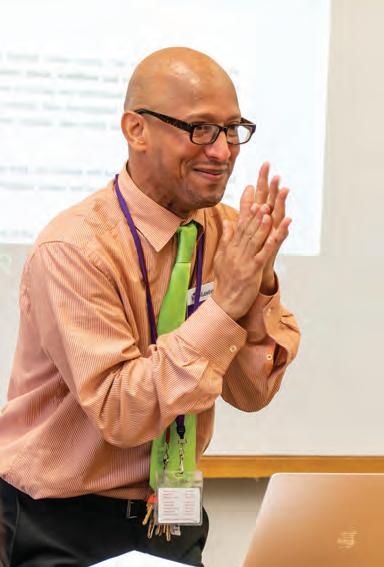






A Message from LAURA DANFORTH
The Masters School has long enjoyed a reputation for excellence in music, theater and dance — and with good reason. Our alumnae/i have gone on to perform, conduct, write and teach at the highest levels in their professions. And many who have discovered a passion for music here find joy and meaning in weaving their musicianship into their personal or professional lives.
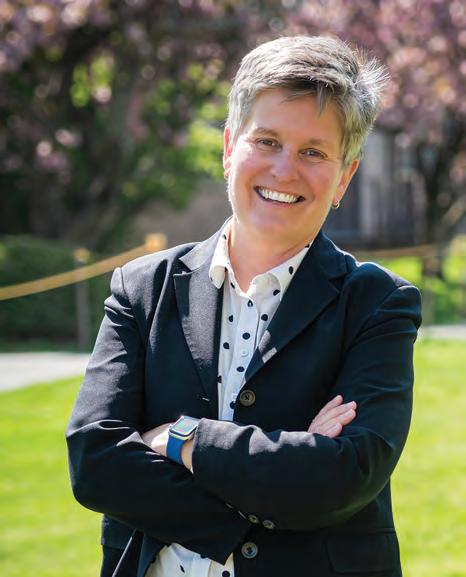
Our School nurtures so many gifted musicians, and our performing arts facilities must match their talent and drive, inspiring them to hone their craft. Through the historic Our Might campaign, we are creating new spaces for our pioneering performing arts program. On the Masters horizon is the imminent renovation of Strayer Hall, to be followed by the creation of a state-of-the-art theater. These beautiful, vibrant facilities will be places where talented performers can excel and all Masters students can benefit from an education that is profoundly enriched by the arts, culture and performance.
Contemporary performing arts spaces will continue to serve as a focal point for our community to gather, to share and to celebrate the joy of artistic performance. At Masters we are committed to cultivating a culture where the performing arts flourish, bringing “wings to the mind” and “life to everything.”
With gratitude,

Laura Danforth Head of School
Music gives a soul to the universe, wings to the mind, flight to the imagination, a charm to sadness, and life to everything.*
Our School nurtures so many gifted musicians, and our performing arts facilities must match their talent and drive, inspiring them to hone their craft. ” “
* Attributed to Plato, Wordsworth Dictionary of Musical Quotations, 1991, p. 45
Esteemed conductor and Masters alumna Marin Alsop ’73 once compared musicians
to a prototype for the ideal 21st-century human being, explaining that they possess all the necessary skills to be successful in an ever-changing world: “They’re self-motivated, they know how to practice every day, how to self-assess and self-critique. (They) know how to budget their time, and on the job, they know how to listen to each other, when to step back, when to step forward. All of those skills are critical to collaborative work… and they learn about finding solutions.”
Masters has a long history of cultivating talent and instilling an appreciation of music in its students. The School’s commitment to music education through its vibrant curriculum of middle and upper school courses and myriad instrumental ensembles and choral groups doesn’t just enhance the overall academic experience it promotes a sense of belonging and camaraderie among students.
As you will read in the following pages, Masters graduates have a deep understanding of the power of music to inspire, connect and enrich their lives and the lives of others. Regardless of their paths as conductors, classical pianists or singer/songwriters these alumnae/i vividly recall the encouragement and inspiration they received from their music teachers to pursue the arts.
“Music is a vital part of life at Masters,” says Jennifer Carnevale, chair of the Department of Performing Arts. For alumnae/i, current students and generations of Masters students to come, that’s music to our ears.







Many people take piano lessons as children. Few turn it into their life’s work.
Then there’s Randi Gronningsater Stroh ’67.
Stroh knew she wanted to dedicate herself to music at an early age. She started studying piano at 5 with a teacher in Dobbs Ferry, where her family had moved from New York City.

“I did well,” recalls Stroh, who attended public school through eighth grade. “I had an aptitude and interest, and was eager to learn. Music was my favorite subject, and I was drawn to performance pieces.”
When she enrolled at The Masters School for high school, music was life-changing. Two of her teachers, Grete Sultan and John (Jack) Pierpont, remain powerful influences, says Stroh, who describes herself as a pianist in the Western tradition, illustrated by composers like Bach, Haydn, Mozart, Chopin and Beethoven.
Sultan was “the best piano teacher” she ever had, Stroh says. “She recognized that I had talent and desire, and was willing to practice. She struck the balance between pushing me, with work that was challenging to do, but not to the point of being pushed too far, too fast.”
Stroh has embraced that philosophy. “It relates to my approach to teaching. It's not just teaching skills. It's not fitting the student into the program — it's adjusting to what the student responds to. Ms. Sultan understood me. I take that as my approach to my students.”
Stroh also credits the importance of Pierpont, who was then the chairman of the Music Department, as central to her development as a musician. Not only did he teach her theory and composition, but he also encouraged her leadership skills by making her assistant director of the Glee Club, which he led. “I probably jumped at it,” she recalls. “My role was to help and support him.” Stroh’s responsibilities included conducting rehearsals, making sure everyone was ready for rehearsals, and lining up singers on the risers. “Basically, it was whatever job Jack gave me. I was a constant presence.”
Stroh still treasures a single line Pierpont wrote in a 1967 letter of recommendation, which reads, “Her deeply felt interpretations have always been very genuinely her own.” Pierpont also wrote in a letter the year before that Stroh “has a ‘steel-trap mind,’ musically speaking, which takes in, digests and brings forth a newness which is a rarity among students of her years.”
Masters was critical to Stroh’s intellectual and musical development. Besides music, some of Stroh’s favorite
“RIGHT: Stroh, seated at the bottom right, was an active member of the Glee Club and the group's assistant director.
BELOW: Stroh, standing on the right, is a proud Delta.

[ Music is ] about opening doors, connectivity and building bridges, which I think is important in today's world.
”

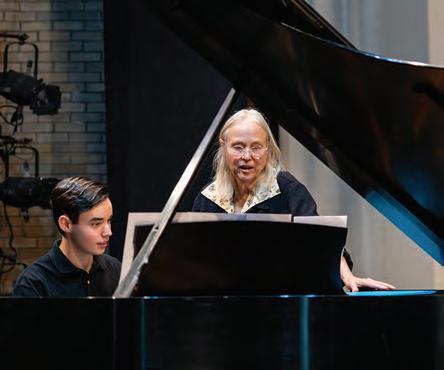
ABOVE: During her visit to Masters on May 3, Stroh gave a master class to three piano students, including Avery Kahn ’24.
subjects were Latin, geometry and history. She recalls how she “grew leaps and bounds as a young musician. I was nurtured in a space where I was involved in my own education. I had great guidance and was allowed to find my own way. I got to that space at age 17.”
The School also offered Stroh ample opportunity for leadership in other areas. She was president of the senior class, a member of the Student Council, a basketball player and a member of the Dobbs Athletic Association.
Stroh went on to Smith College, where she earned a degree in American studies with a minor in music in 1971. She was also part of Smith’s choral program.
After college graduation, Stroh moved to Colorado where her mother, a native of Colorado Springs, had deep family roots (Stroh was particularly proud to become the fifth generation to live in Colorado). She earned her bachelor’s degree in music from the University of Colorado at Boulder in 1975 and a master’s in music there in 1982. She and her husband, Tony Stroh, live in Boulder and Crested Butte.
Music has been a constant in her life, whether as a performer, teacher, administrator, arts advocate or music critic. “My career really seems like variations on a theme,” says Stroh,
who readily acknowledges her less-than-direct career trajectory. “It always circles back to piano performance at the center.”
As Stroh says, “I go where the road takes me.” She became an arts administrator almost by accident. She started playing with a cellist in Colorado, and together they founded The Boulder International Chamber Players. Stroh became president of the board and executive director of the organization. She was a founding board member of Boulder’s Dairy Arts Center, “a groundbreaking organization for playing world music,” not just the Western canon. Now that she’s recently rotated off the board of the Center for The Arts Crested Butte, Stroh wants to “get back to my own work as an artist.” Another project that she started in 2022 is The Circle of Time studio in Boulder, with a focus on arts education and performance space.
During a phone conversation in early March, Stroh observed that with music, “The highest form of art is created” in the interaction between performers and the audience members. “Composers leave notes on the page,” Stroh says. “They also leave a message, for us to decide and discover. We have choices as audience members and performers. Art is created through our interactions and experiences.”
She is quite particular about how, as well as what, she performs. “I only perform when I feel I have the piece where I want to,” Stroh says, who also plays the keyboard instruments the clavichord and virginal. “It’s having the notes and feeling solid about the interpretation, as well as other aspects.”
One of her concerns and motivations is the current state of classical Western music and the challenge of finding audiences to sustain it. “Most of the composers I play have been long dead,” she says. Still, “Their spirit is alive.” And keeping those musicians relevant for young people is critical to Stroh.
As she observes, “There’s often a glass curtain between the performer on stage and the audience. The music is seen as a relic from the past.”
Stroh intends to do everything she can to ensure classical music remains vibrant, emotionally resonant and compelling for audiences.
“It’s about how it can affect and change people,” Stroh says. “It’s about opening doors, connectivity and building bridges, which I think is important in today’s world. If we don’t figure out how to get younger people inspired by this music, the live performances of classical music will disappear.”
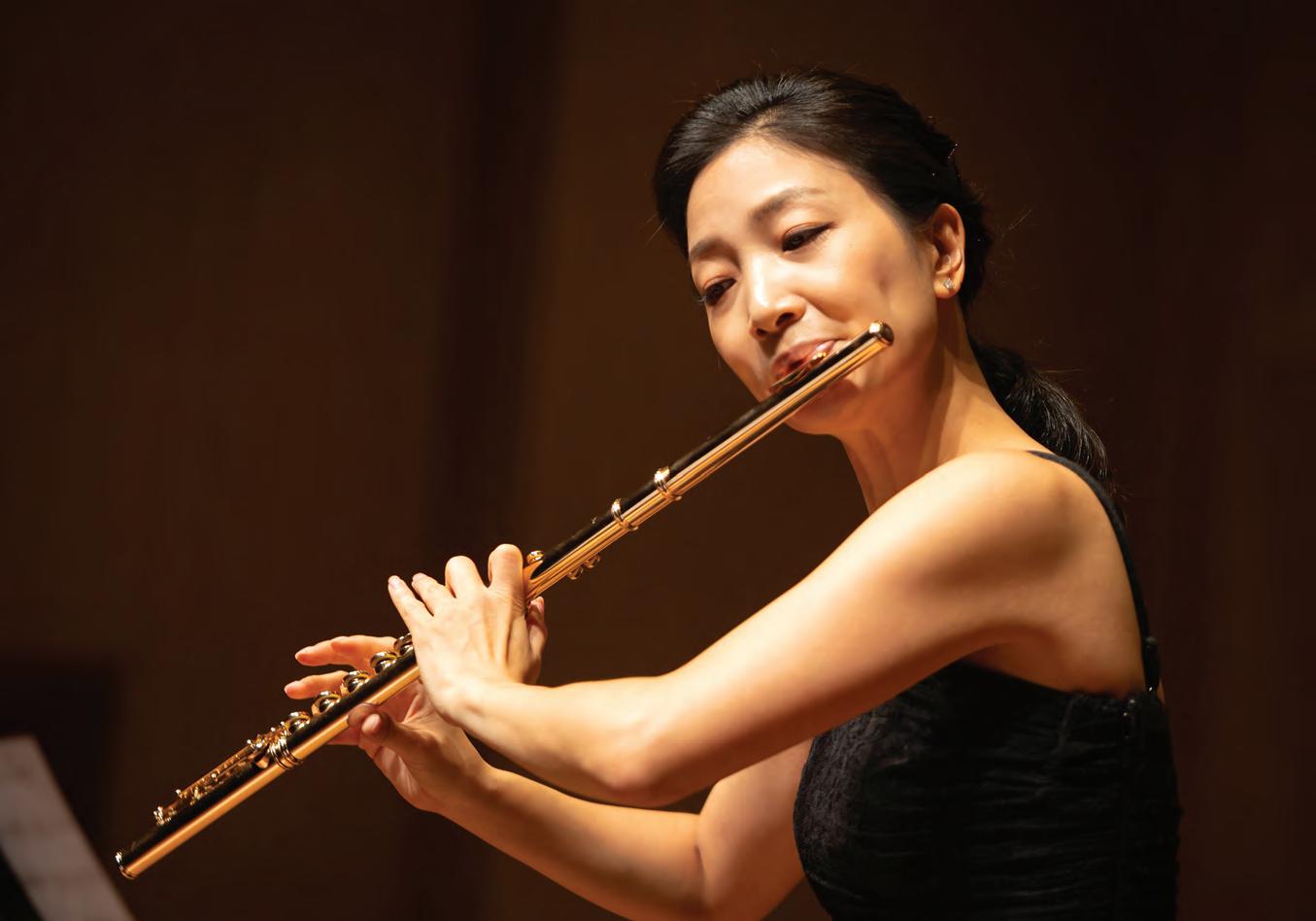

My parents chose Masters because of the support from the School to study music... ” “
TELL US YOUR JOURNEY PURSUING A CAREER AS A FLUTIST/MUSICIAN.
I played several instruments when I was young: piano, violin and the cello, but I didn’t really like any of them. I had a friend living one floor below me who had a sister studying the flute in Paris. One day, I heard her playing and was immediately inspired. For the first time, I really wanted to try an instrument.
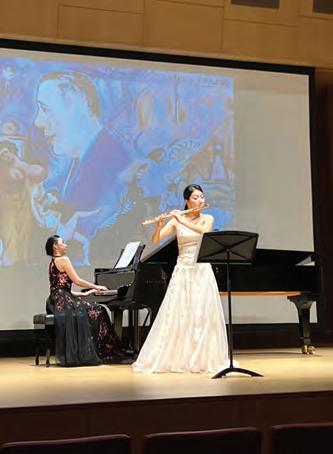
After graduating from Masters and the Juilliard Pre-College program, I moved to Philadelphia, where I continued my flute studies at the Curtis Institute of Music. It was a big change for me as I was finally being treated as a professional musician and not a student. I tried hard to become the musician they were looking for. I moved to Cincinnati for graduate school before returning to New York for a professional studies program at the Manhattan School of Music. After graduating, I moved back to Seoul, Korea, and continued my career as an orchestral flute player and professor at several colleges. I have been working as a soloist, chamber musician and a professor.
My passion and confidence in performing in public grew as I gained more of those experiences at Masters.
” “
WHAT ARE SOME OF THE HIGHLIGHTS OF YOUR CAREER?
I am a member of an ensemble, Poolim, in Korea, which integrates various Western and Korean traditional instruments to create meaningful, cross-cultural music. This genre of our own was fortunately well-appreciated by major foreign figures, and we performed at major meetings including the G20 in Busan representing South Korea.
WHAT ARE SOME CHALLENGES YOUʼVE FACED, AND HOW HAVE YOU OVERCOME THEM?
I had a bad injury on my left wrist during my freshman year of college due to excessive use when playing the flute. The school was very supportive of my recovery process and my playing post-recovery.
ARE THERE ANY COMPOSERS OR MUSICIANS WHO HAVE HAD A SIGNIFICANT INFLUENCE ON YOUR STYLE OR APPROACH TO PLAYING?
The honorable flutist Julius Baker was my teacher at Curtis and, at the time, he was a living legend. Over the age of 80, he was still playing the flute and he had extremely sensitive ears to listen and provide feedback on my playing, which I appreciated. Unfortunately, he passed away two years after I graduated. Even now, when I listen to his recordings, I can’t help but be amazed at the beautiful sounds and musicality he crafted through his music.
WHY MASTERS?
My parents chose Masters because of the support from the School to study music, and because the conditions were perfect for my sister and me to attend the Juilliard Pre-College program on the weekend. My sister was at Masters for a year prior to my arrival. That helped me a lot in adjusting to the new environment. I could depend on her. My brother came to Masters after I graduated. He envied my sister and me being happy and enjoying Masters while he was at another school. I could tell that he changed into a new active person from his experience at Masters.
HOW DID YOUR EXPERIENCE AT MASTERS SHAPE YOUR MUSICAL DEVELOPMENT AND CAREER PATH?
I had great support from Masters and also from Juilliard Pre-College. I was happy to spend time at the music building at Masters as much as I wanted and needed. I was allowed to stay to practice even during study hours if I was done with my schoolwork. I could focus and work on my music in a protected and quiet space by myself.

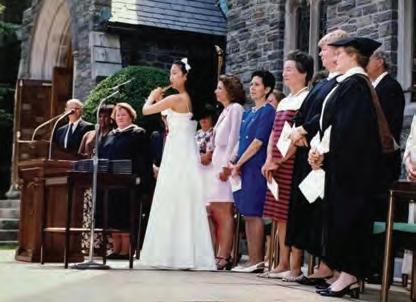
ABOVE: Lee performed at her Masters School graduation.
I performed at my middle school graduation at Estherwood and also sang the national anthem at my high school graduation. My passion and confidence in performing in public grew as I gained more of those experiences at Masters.
WHAT CLASS OR TEACHER AT MASTERS HAD THE BIGGEST IMPACT ON YOU?
Dr. Nancy Theeman! She helped me a lot and encouraged me to challenge myself and audition for scholarships and competitions all over New York State. I earned a lot of awards and performed at various venues. I kept winning so many awards.
FONDEST MEMORY OF MASTERS?
Snow days. It snowed a lot during my time at Masters. If I saw it snowing in the morning, I would turn on the radio to check if Masters was on the list for school closings. My friends in the dorm and I loved to order Chinese food and pizza.
TELL US ABOUT YOUR PLAYING FIELD HOCKEY AT MASTERS.
Since I was young, I had the chance to try out for different sports and I loved playing. I was very happy at Masters in my first year as an eighth grader and played many new sports that I hadn’t done before, such as tennis and soccer. As I moved to high school, I was thrilled to choose new sports again. The first time I saw the field hockey uniform, I really wanted to play that sport. I tried out and luckily I made the varsity team in ninth grade. Every year I looked forward to field hockey season. But my flute teacher at Juilliard wasn’t happy about my playing. He tried to persuade me not to play sports because of the potential injury to my hands. As a result, I didn’t join the team my senior year.
ADVICE TO MASTERS STUDENTS WHO ARE LOOKING TO PURSUE A CAREER IN MUSIC?
Stay sincere in all you do.
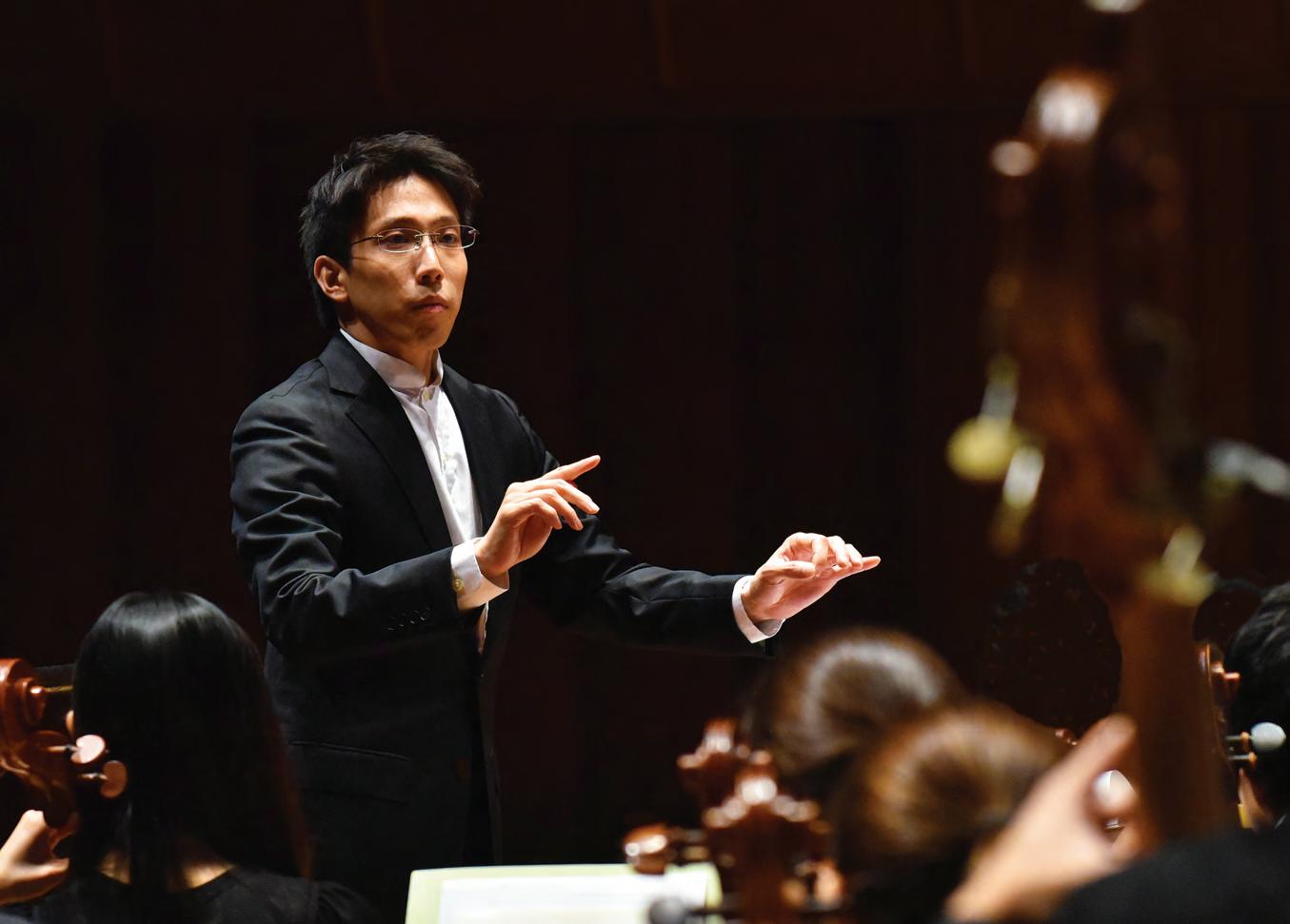
Kubota is the music director of Orchestrada Tokyo.
In 2011 he won the Chicago Symphony Orchestra’s (CSO) First International Sir Georg Solti Conducting Competition and Apprenticeship and subsequently served as CSO’s conducting fellow under its music director, Riccardo Muti.
Kubota has conducted premier ensembles including the Milwaukee Symphony Orchestra, Civic Orchestra of Chicago, Melbourne Symphony Orchestra, Orchestra of Sofia, Orchestra della Toscana and PMF Orchestra (Sapporo). He received his master's in orchestral conducting from The Juilliard School and a professional study diploma from the Mannes College of Music.

“
...the most important role of a conductor is to enable all players to express the music more freely, comfortably and richly... ”




How did you learn about Masters?
Our family visited several high schools in the New York area, and when we met Susan Hendricks, then director of admission, I wanted to attend the School. Her friendly yet gracious demeanor said it all about Masters.
How did your experience at Masters shape your musical development and career path?
The Harkness table had a profound impact on me. It facilitates the discussion in such a way that the teacher’s knowledge is not directly conveyed to the students, but rather is discovered by the students. The answers they receive are acquired as more flexible and permeable information than knowledge that is directly conveyed. This is very similar to the role of a conductor in an orchestra.
Which teacher at Masters had the biggest impact on you?
I was very impressed with the English classes with David Lehner. In terms of the biggest influence, I have to mention Nancy Theeman, then head of the Music Department.
She welcomed me warmly from day one, even though I spoke no English. When I told her that I wanted to be an orchestra conductor, she said, “The orchestra starts next week, so go ahead and conduct.”
Normally, conducting requires knowledge, experience and communication skills. However, when she told me to give it a try without asking me any such questions, I felt the depth of her and Masters’ spirit.
Fondest memory of Masters?
Masters provided an education that makes the most of each student’s individuality.
Masters is located only 40 minutes away from Manhattan by train, and Manhattan attracts top-notch artists from around the world, with world-class performances at Carnegie Hall, the New York Philharmonic and the Metropolitan Opera.
Although there is a strict structure in school life, requests to attend such events were always granted. Even during weekday classes, we were invited to attend a rehearsal of the Colorado Symphony Orchestra when they performed in New York. Marin Alsop, a world-renowned conductor and Masters alumna (Class of 1973), was the music director of the Colorado Symphony Orchestra at the time, and I still remember being impressed by the intensity of my first exposure to professional orchestra rehearsals and her strong leadership.
LEFT: Kubota, seated on the left in black, with Nancy Theeman, chair of the Music Department, and the 2010 Masters orchestra.
What or who inspired you to pursue a career as a conductor?
“A conductor is not a dictator who tells you how to play. A conductor is a person who listens to all the players and guides the music with a clear direction, while at the same time bringing all the players’ ideas together.”
— Claudio Abbado
When I was in junior high school, I watched a documentary on the Italian conductor Claudio Abbado and became interested in the job of a conductor. Later, his ideas overlapped with Masters’ Harkness method.
I learned that the most important role of a conductor is to enable all players to express the music more freely, comfortably and richly before communicating his or her musicality and artistic sublimation of the music to the orchestra.
What are some highlights of your career so far?
The greatest highlight of all was the opportunity to learn from Riccardo Muti, who served as music director of the Chicago Symphony Orchestra for 15 years.
He taught me how to deal with performers, what art is in society, and what traditions we must carry on in the future. Of course, it is impossible for me to reach his level of excellence, but I try to understand his teachings as much as possible and incorporate them into the music I create.
What challenges have you faced as a conductor, and how have you overcome them?
An orchestra is a microcosm of society, and there are players with various ways of thinking. There are many times when we disagree with the players, and the challenge is that we have to create good music in spite of this.
It may be an obvious answer, but I think it is important to calmly assess why the other player has reached a certain idea and then find a solution, rather than trying to match the differences on the surface.
What advice would you give to Masters students who are looking to pursue a career in music?
If you are going to have a career in classical music, you must be able to give your all for the composer. The reason we dress formally on stage is not for the entertainment we show as the centerpiece of our performance, but to show respect for the composer we are performing. The most individualistic performance is one that is sincere to the score, with no conscious attempt to be unique.

Years before enrolling at Masters, Vittorio Stropoli ’19 watched his brother Santino, Class of 2013, perform the iconic Pink Floyd album “Dark Side of the Moon” in the first “Great Gig,” now an annual school tradition. It was then that Stropoli first became aware of all that Masters can offer.

party for Masters parents and alumnae/i in December 2023. Kara


“My brother’s connections at Masters exposed him to what was going on in the New York City music scene, and that was a scene I wanted to get into too,” said Stropoli, who grew up on Manhattan's Lower East Side. “That’s why I came to Masters.”
Masters provided him with resources and personal attention that enabled him to develop his musical talents in exciting new ways. Stropoli auditioned for Jazz Band as soon as he could and was admitted as the only freshman in a band otherwise comprised of seniors. He stayed with Jazz Band all four years as well as with the R&B club Positive Rhythm, which he led for three. Playing and learning with older musicians and committed educators like Gilles Pugatch fueled his growth significantly. “That led to what I’m doing now,” Stropoli said.
But en route to what he is doing now — leading his own band and playing with notable artists at renowned venues and festivals across the U.S. and Canada — Stropoli made sure to take advantage of the full array of opportunities that Masters afforded him. “Masters allowed me to nurture my passion for music while encouraging me to explore other disciplines and to grow as a person,” he said.
“
As a boarding student, he was able to attend a pre-college program every weekend at the Manhattan School of Music, which is now his college alma mater. And being on the track team all four years, captain for two, certainly contributed to his performing stamina.
“But,” he said, “maybe the most important thing I did was join the Dobbs 16 a cappella group. I wasn’t a singer. But Ms. Carnevale, Dobbs 16 director, saw that saw that I had a desire to learn. And now I’m singing all the time in my career.”
Santino, his brother, who still plays in an orchestra, recently earned a Ph.D. in physical chemistry from Yale and now works as a research scientist at MIT. While Stropoli has no intention to veer too far professionally from the music world, he has significantly expanded his repertoire beyond jazz to folk, rap, R&B and more, and continually seeks new subjects for songwriting inspiration.
Since leaving Masters, Stropoli has graduated from the Manhattan School of Music with a bachelor’s degree in jazz piano. He now leads his own band and has played with notable artists such as Tiny Habits, Cisco Swank, Linda Diaz and Grammy Award-winning singer/saxophonist Kenneth Whalum. He has performed at popular venues, such as the Music Hall of Williamsburg, and at renowned events including the Montreal Jazz Festival and the Newport Jazz Festival.
“I’m looking for variety, and that comes back to Masters,” he said. “I would go to Jazz Band, go to class, then go to track for three hours. Masters taught me never to be one-dimensional.”
Masters allowed me to nurture my passion for music while encouraging me to explore other disciplines and to grow as a person. ”
Stropoli credits his family and his teachers for never letting him settle into a single groove.

Though her mother tells her she could sing before she could talk, and though she had important musical experiences growing up and attending high school in her hometown of Stuart, Florida, it wasn’t until she transferred to The Masters School that Jess Eliot Myhre ’05 truly discovered the power and thrill of artistic community.


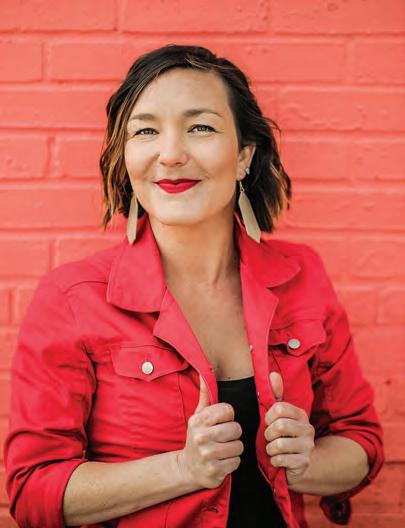

“It was a wonderful culture shock,” she said. “My first high school had a good marching band and choir, but it was all huge and a bit impersonal. Masters was a whole different animal.”
In addition to the exhilaration of professional jazz performances and other musical firsts she discovered on excursions to New York City (“People in the subway playing instruments I didn’t know the name of”), Myhre was empowered by faculty members to make bold music and performance choices. As a member of the a cappella group Dohters, she found particular freedom to explore her sound (a unique combination of folk, blues, jazz and country) and discovered that making music with others could feel nothing short of wondrous.
“We made the music that we wanted, we came up with our own arrangements,” she said. “It was a musical space that felt very sacred. We would have our concerts down in Estherwood — just our voices. As a musician and a person, that experience set a stage for deep wells of spirituality within my music.”
The collaborative and community-based nature of Myhre’s musical experiences at Masters would echo throughout her career. After graduating in 2009 from Wesleyan University, in the throes of the recession, she and her partner decided to scrape by as a musical duo until the economy improved and they could seek more traditional, better-paying jobs. But they fell in love with the folk music communities in Washington, D.C., and, in time, they expanded into a six-piece band called Bumper Jacksons. For over a decade, Bumper Jacksons brought an urban and rural blend of early Americana to festivals, concert halls and other stages, producing multiple albums and garnering numerous awards along the way.
Myhre is now completing a master’s degree in urban and regional planning at Georgetown University, where she is investigating the impact of climate change on the future of outdoor music festivals and how to ensure that music and community stay intertwined. And although Bumper Jacksons celebrated its final performance earlier this year, Myhre continues to perform as much as ever, often with other artists. She also teaches as much as she can, helping younger artists learn to navigate the industry and relish the opportunities of a creative life.
“Getting to make and build a life on my own terms in my early adulthood was a beautiful thing,” she said.
During her three decades in the music business, Kara DioGuardi ’88, P’31 has witnessed more revolutions than a vinyl disc on a turntable.
For DioGuardi — a Grammy-nominated songwriter and former “American Idol” judge — one thing has remained constant: the importance of hard work, a value instilled during her time at The Masters School.

“Masters allowed me to dream,” said DioGuardi, whose songs have appeared on more than 160 million records. “But if you dream it, just make sure you do it with thy might.
“I really believe that in the music business — and I tell people this all the time — sometimes it’s not about being the most talented; it’s about being the most driven, just trying to make it happen from every angle and not stopping. And that’s where that motto has really served me: It’s about being the last person standing.”
And DioGuardi is standing tall — and reaching far and wide in the industry. As co-CEO/founder of Arthouse Entertainment Publishing & Records, DioGuardi has been instrumental in building the careers of chart-topping multiplatinum singer/ songwriter Jason Derulo, three-time Grammy-nominated artist and songwriter Ingrid Andress, and GAYLE, whose song “abcdefu” became a viral smash hit with 1 billion streams on Spotify and a Grammy nod for Best Song.
“I’m astonished at the amount of talent, talent that you didn’t even know existed out there,” DioGuardi said, citing the power
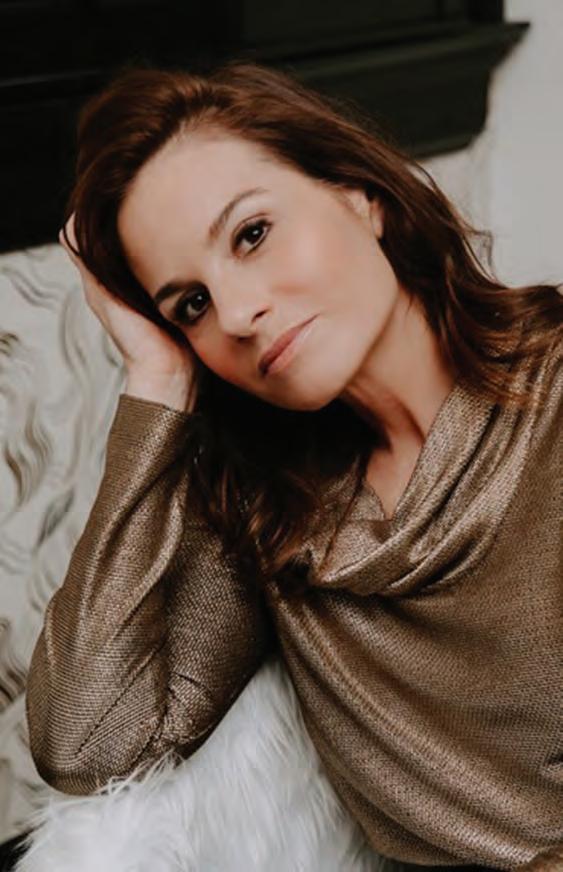
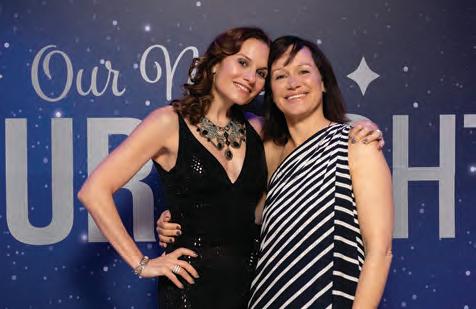
of social media to flood the market with artists. “I tend to not look at statistics. I feel like there are so many companies out there with mechanisms and technology for spotting when something is buzzing. What I tend to do is I look for talent that’s developing but hasn’t reached the moment where everybody knows it yet and I believe has the capacity to break through, like a GAYLE, like an Ingrid Andress.”
In addition to developing talent, DioGuardi is working to connect artists with one another. As CEO/Founder of Briidge App, currently in the development stages, DioGuardi’s goal is to establish the first music platform that matches music creators based on their skill set, location
performing arts at The Masters School during the Our Might, Our Night gala in spring 2023.
and personality. “There’s a psychometric component,” she said. “So when we match artists it’s not just about what you do but who you are and how you work.”
And these days most artists have never worked harder.
“Every musical artist today, whether you’re a songwriter or performing artist, really has to learn every aspect of the music industry, from writing songs to producing to how to record them and how to market yourself to how to create a live show,” DioGuardi said. “Today, either the kids are developing themselves and they’re getting to a point where there’s so much buzz around them on social media that the record labels are
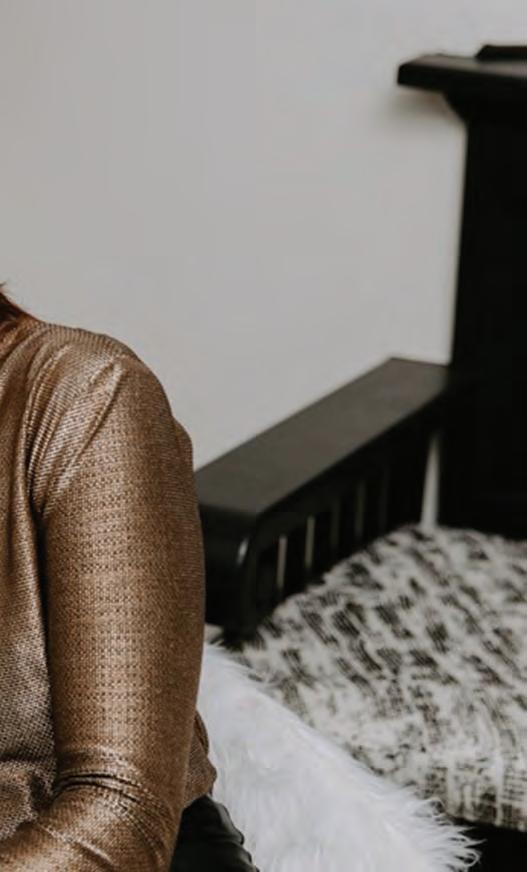

coming in and saying, ‘Okay, we love what you’re doing, we just want to help get it out there to the rest of the world.’ And that’s what they’re really good at. But the development is kind of happening with the artist first, and that’s exciting and hopefully will lead to fairer deals with artists because they can actually own more of their rights.”
In that vein, DioGuardi serves as a member of the board of trustees of The Mechanical Licensing Collective (The MLC), a nonprofit organization created after the Music Modernization Act of 2018. The legislation created a blanket license for streaming services and established the MLC to make it easier for songwriters, composers, lyricists and music publishers to collect royalties.
“It’s historic in the sense that never before have publishers and songwriters sat on the same board,” DioGuardi said. “We’re there to govern the collection of royalties [due under licenses] from the digital service providers.”
“
Masters allowed me to dream. But if you dream it, just make sure you do it with thy might. ”
DioGuardi also serves on the board of the NMPA S.O.N.G.S. Foundation (Supporting Our Next Generation of Songwriters). Established in 2015 by the National Music Publishers’ Association in 2015, the S.O.N.G.S. Foundation supports songwriters through funding educational programs, direct financial assistance and services, and partnerships with like-minded institutions and organizations to enhance opportunities for music creators.
Along with her board positions, DioGuardi uses her might to amplify the voices of young artists and provide mentorship and scholarships through her own nonprofit organization, Inspired Nation.
“I started this organization to help give young musicians a platform to express themselves through music where they can use their talent to give back to people in their generation who need our help,” she said.
Inspired Nation collaborates with compatible organizations such as the Tour Music Fest, the biggest European contest for emerging singers, singer-songwriters and rappers, and DioGuardi has served as the president of the European Judging Panel since 2019. The group connects aspiring artists with music professionals for mentoring and funds scholarships to the Berklee College of Music where DioGuardi was a Herb Alpert Visiting Scholar from 2013-2023.
“I really believe that if you want to do something, you’ve got to really commit to it and go all in,” she said. “I’ve waited for those moments when I’ve said I really want to do this, and I feel the next natural progression is to do it with thy might. And when I start doing
it with my might, it always works out because I’m working harder than everybody else.”
So … what is next? Screenwriting, acting class and a musical adaptation are just a few new projects.
“I’m in a place in my life where I’m trying to free myself up to be creative in ways that I haven’t been before, and that’s really exciting,” DioGuardi said.
Adding to her very full plate, DioGuardi is currently co-writing the music and lyrics for an adaptation of “To Sir, with Love,” a new musical based on the novel by E.R. Braithwaite. The show had a reading in November at the Ogunquit Playhouse in Maine.
“The musical is still in the development stages, and it’s been so much fun,” DioGuardi said. “I’m really enjoying the process of telling someone else’s story. What’s so great about musicals is that when the character hits a place where just speaking is not enough to convey an emotion, they have to break into song!”
DioGuardi has also been exploring new ways to tell stories beyond songwriting by taking acting and screenwriting classes — both very new for her.
“My Masters education lends itself to that sort of thinking,” she said. “When I was there, it was really, ‘Who do you want to be? How do you want to express yourself?’
I never felt a limit to what I could do. And now my son is at Masters, and he’s thriving. He’s allowed to be who he is, and they fully support that. The School is really a champion for the individual.”
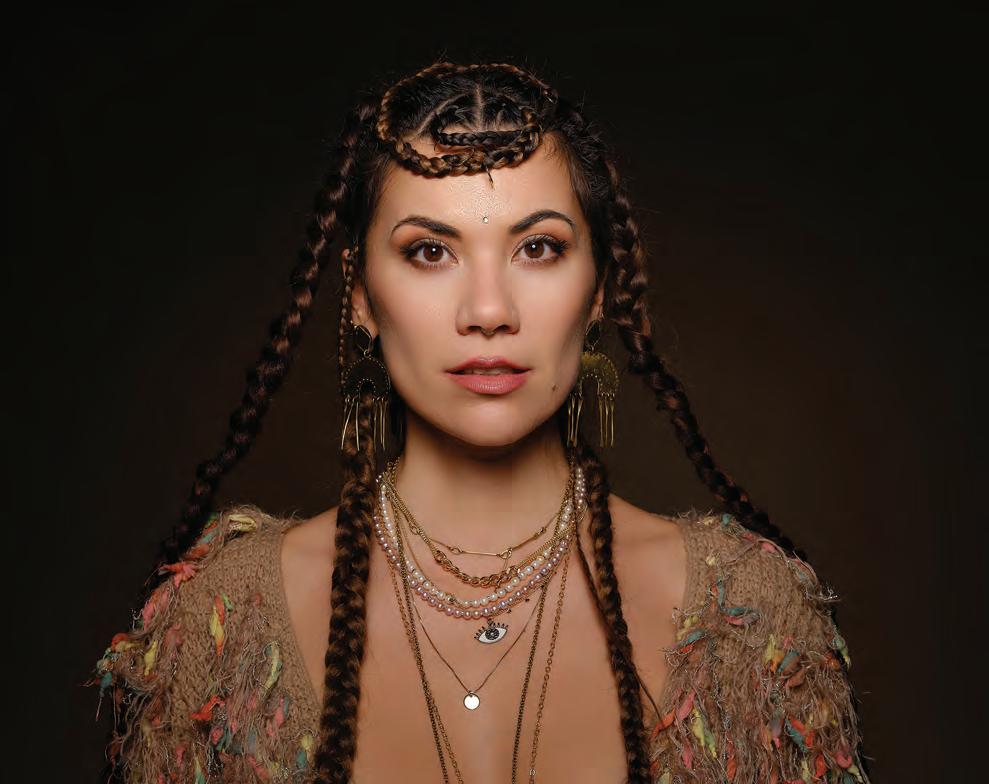

When 16 - year - old Dorotea Zovko '08 arrived at Masters from her native Croatia she felt as if she'd wandered onto the Great White Way.
“Everybody was kind of like a triple threat: dancer, actor, singer,” said Zovko, a folktronica/soul/fusion traveling musician who performs under the moniker Aklea Neon. “It seemed like they were all ready for Broadway! Everyone was taking it to the next level (compared to my classmates in Croatia), so it pushed me to take it to the next level as well.”
Now Zovko is a triple threat in her own right: an award-winning singer/songwriter, an eco-conscious activist and the leader of an all-girl band, the Sound Doulas. And, true to the Masters motto, she’s doing it with her might.
It’s about “believing in myself and really standing tall and not letting anyone else’s opinion influence my art,” Zovko said. “Trust your vision, speak your truth — that’s the real ‘might’ — and follow your inner flame. If you do that, you’re so mighty nothing can get in the way.”
While at Masters, Zovko immersed herself in several of the School’s music programs. She was a member of Urban Connection, the step/hip-hop dance group, and Dobbs 16, the a cappella choir.
“Dobbs 16 stood out the most,” Zovko said. “We went on tour in China, which is a wonderful memory. Dobbs 16 Director Gillian Crane was my biggest influence; she was just incredible to me. I also fell in love with a guy who was part of the group, so I really found everything there, and I looked forward to every rehearsal.”
Now based in Croatia, Zovko shares a blueberry farm with her fiancé (a different guy). She is working on an experimental and experiential type of music creation — music of the plants.
“I have a device that puts electrodes on the leaves and the roots of the plants so I can make the plants sing,” she said. “I also collaborate with the plants, and we do our own type of plant orchestra. It’s pretty sweet.”
Although her time at Masters was short, Zovko’s study abroad experience has had a lasting impact on her life and career. “In Croatia, we don’t have as many places where you can belong and where beautiful nature is all around.”
What advice would she offer current students?
“Use the incredible opportunities that Masters has to offer,” she said. “The students are blessed to have all those resources. They should come for an exchange in Croatia to see how blessed they are.”
Trust your vision, speak your truth — that ’ s the real ‘ might ’ and follow your inner flame. ” “

“Music pushed me to be more outgoing,” said Friedman, who writes, records and releases music under the name Sydney Lauren. She discovered her passion at 14, when she picked up a guitar at summer camp. “I fell in love,” she recalled. “From there, I took piano lessons and became obsessed with all things music.”
Joining the Masters community in tenth grade gave her the opportunity to explore and hone her musicianship. She sang in Dobbs 16 and Dohters, and took voice lessons. She has fond memories of heading to Strayer Hall practice rooms with friends during lunch and making music together. “It felt like such a creative space,” Friedman said. “The community was always extremely supportive, and I grew so much as a person at Masters.”
She counts Dobbs 16 Director Gillian Crane as a mentor. “She helped me come out of my shell and become more confident in performing,” Friedman explained.
Sydney Friedman ’12 describes herself as an “extremely shy” child. Then, she found her voice.
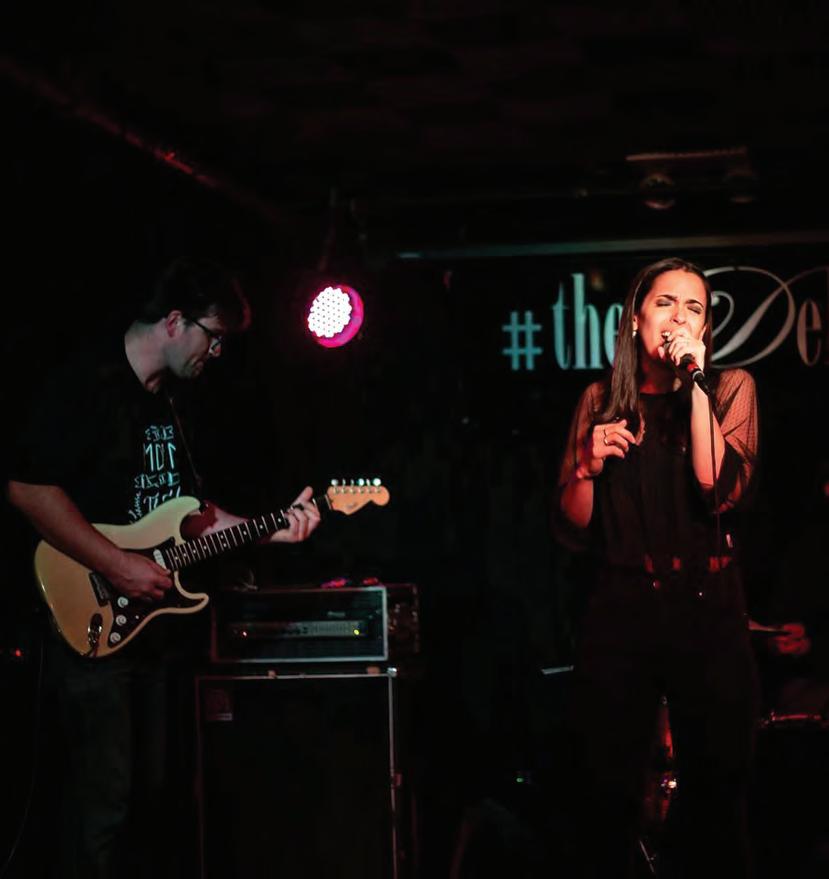
During her junior year, what may have seemed like a roadblock in her musical journey turned out to be the start of a new path. “I had a polyp on my vocal cords and couldn’t sing for three months,” Friedman said. “I started working on songwriting during my voice lessons, and the rest is history.”
After graduating from Masters, Friedman attended Berklee College of Music and received a bachelor’s degree in music business, songwriting and performance.
Given her background, it’s not surprising that, today, Friedman lives and breathes music. Her 9 to 5 is in the music industry, where she works on the client side of the business, and creates music that she describes as “pop with a touch of country.” New York City, where she lives, continues to be a wellspring of inspiration for her work.
Her songs have been included in several television shows: “The Biggest Loser,” “The Next Black Millionaires” and “Temptation Island.” She says it was “extremely exciting to watch” the episodes in which her songs were featured.
As a professional on the industry side and a creator, Friedman has an important vantage point. “It’s easy to get sucked into what’s trending, which social media app you need to keep up with to break in, etc.,” she said. “You can forget why you started making music in the first place.”
As she looks ahead to the release of her new EP, Friedman shared the principle that has served her well throughout her career: “The best music I’ve made is the sound most true to myself.”

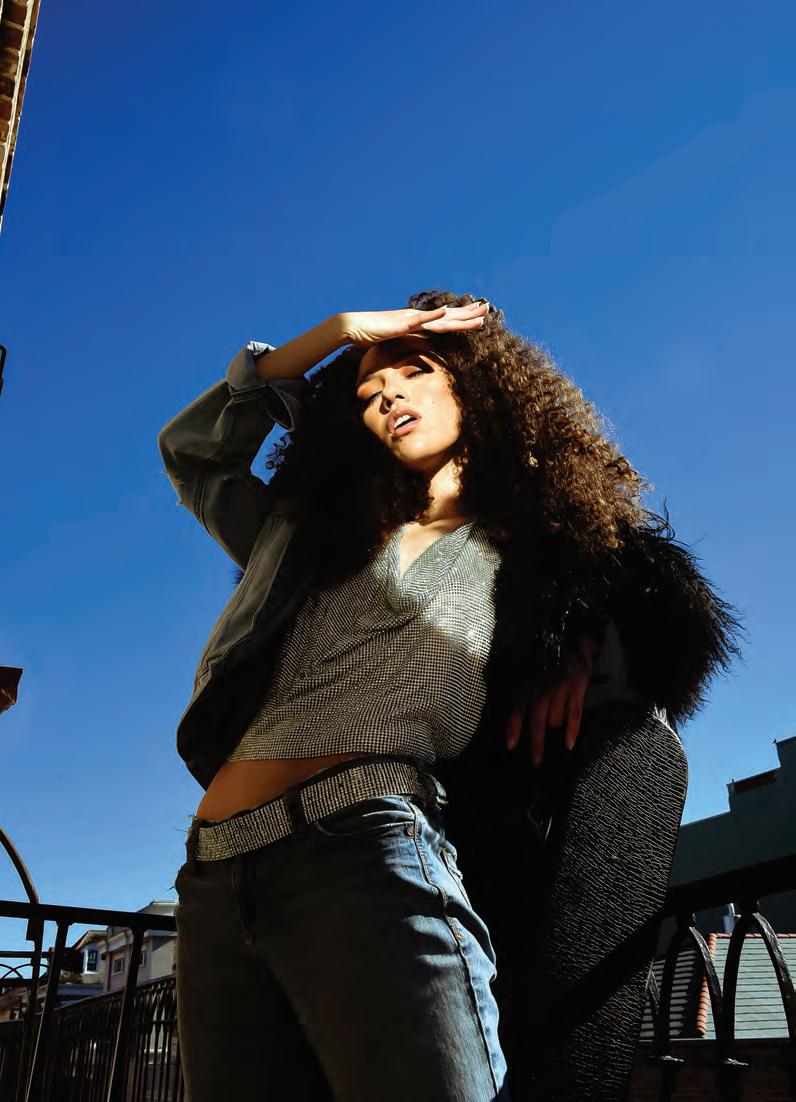

Grace Gibson ’10 is on the move.
She’s headlining at the world-famous Apollo Theater in Harlem, appearing at Jazz Fest in New Orleans, performing at a birthday celebration concert for the late Prince at Paisley Park, and shadowing actor/producer/director Debbie Allen as a director’s apprentice on “Grey’s Anatomy” in Los Angeles.
And she traces her expansive artistic journey back to her “life-changing” experience at The Masters School.
“I was a multihyphenate at Masters,” said Gibson, a New Orleans- and Los Angeles-based musician, singer, bandleader, ethnomusicologist, songwriter, filmmaker, actor, director and performer. “But I was known for being a dancer on campus,” she said. “There’s still a plaque on the wall with my name as ‘Dancer of the Year.’ I was super serious and very intense about it.”
As an upper school student, Gibson joined Jazz Band and served as president of MUSE, a student-run group that explores, creates and performs all genres of dance. She was also co-president of Urban Connection, the step/hip-hop group.
“Mr. Pugatch’s music program was great,” Gibson said. “Meeting Gillian Crane, director of Dobbs 16, was life-changing. She was really invested in people’s creativity at the School. And Mary Rotella, the dance director, had a huge influence on me and was very supportive of my artistry. It’s important for kids to be surrounded by people who believe in them.”
Gibson is especially grateful for a Masters program that invited guest choreographers to work with students, introducing them to various styles of dance.
“It was so cool to learn flamenco, African dance and the Horton technique,” she said. “And we learned from one of dancer/choreographer Twyla Tharp’s protégés, who was also a teacher at Columbia. That was one of the reasons I went to Barnard.”
Gibson eventually transferred from Barnard to Berklee College of Music, and after graduation moved to New Orleans to pursue her musical career. There, she founded Rock Noire, a community, genre and movement that honors the Black roots of rock ’n’ roll.
“Going to New Orleans was influenced by all of my educational experiences starting with Masters,” Gibson said. “One of the things that Masters impressed upon us was to be curious and to ask questions. If you’re going to learn something, really learn it and Do It With Thy Might, as we say. Build the community, entrench yourself in something and put yourself shoulder to shoulder with people.
“Coming to New Orleans and studying the scene and seeing what was needed and using deductive reasoning, like ‘They have this and that but they don’t have this,’ we were able to make a bit of a splash with Rock Noire, and we’ve had exponential growth,” she said. “In the same year I went from being a singer on Frenchmen Street to warming up the stage for Oprah at Essence Festival!”
“
Going to Masters was the first step of betting on myself. Being surrounded by my very talented and hardworking musical peers and having such supportive teachers and mentors inspired me to keep pursuing the arts. ”
With a debut EP “Chartreuse Blues” coming out this year; a multipart autobiographical modern-day rock opera, “River Queen,” in production; and an apprenticeship with Debbie Allen as a shadow director on the 20th season of “Grey’s Anatomy,” Gibson continues her run as a multi-hyphenate artist that began when she was a student at Masters.
“Going to Masters was the first step of betting on myself,” Gibson said. “Being surrounded by my very talented and hardworking musical peers and having such supportive teachers and mentors inspired me to keep pursuing the arts.”
For singer, songwriter, guitarist and poet Dana Williams ’07, the numbers add up:
Streams on Spotify: 100 million+
YouTube subscribers: 67,500
Followers on Instagram: 25,000+
Origin story: Dobbs 16
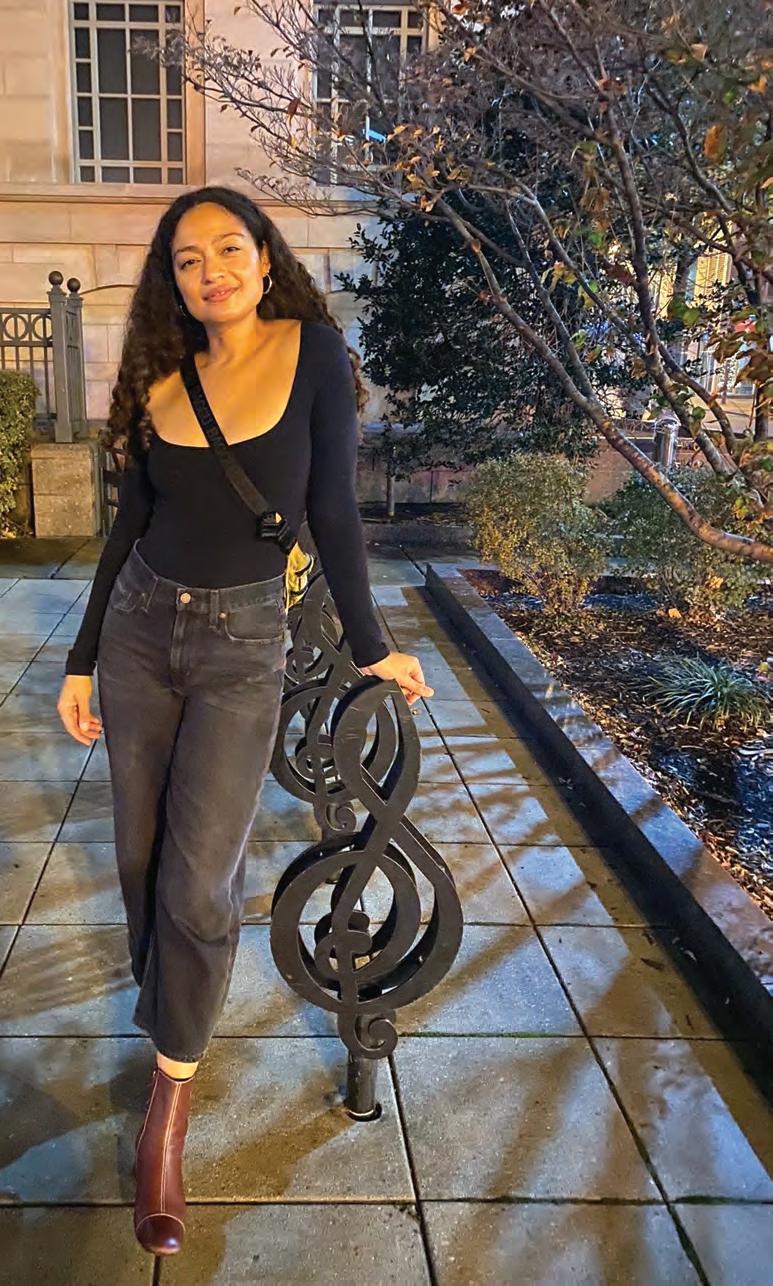
“Masters provided such a nurturing creative environment,” said Williams, who credits the School with laying the foundation for her successful career as a selfdescribed “ethereal folk soul” artist.
“Doing concerts with Dobbs 16 was an important outlet because I was so introverted in high school,” she said. Williams also cites her membership in Glee Club and her guitar teacher, John-Alec Raubeson, as important influences.
“The Music Department cultivated a very nice community where everyone was always sharing ideas, writing songs, forming bands and jamming,” Williams said. “It was a safe space to create.”

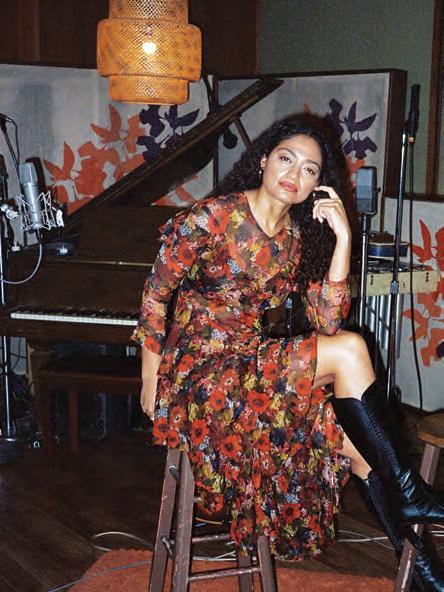

At Masters, with the Harkness method, the School cultivates the independent and creative thinker; it helps students think for themselves. ” “
Although Williams comes from a musical family — her father was a professional songwriter and guitarist — she honed her talents at Masters.
“I enjoyed learning guitar from Mr. Raubeson,” she said. “As a teenager you don’t want to be taught by your parents, and Mr. Raubeson’s low-pressure approach worked well with my personality. We would just learn songs that I liked, and he inspired me to keep playing.”
After Masters, Williams attended Sarah Lawrence College, where she double-majored in music and creative nonfiction.
“My English classes at Masters inspired me to pursue poetry as a major, which has had a direct impact on my songwriting,” Williams said. “And music teacher Gilles Pugatch was a great mentor at Masters as far as music theory,” she added.
“I love music theory!”
Following college graduation, Williams moved to Los Angeles to pursue her music career full time. In 2014, she released her first EP, “The Lonely One,” and one of the songs on the album (“Keep Me Waiting”) was featured on the soundtrack to “Whiplash,” the 2014 Oscar-winning drama. That same year, Williams appeared — and placed — on the singing competition series “Rising Star”;
collaborated with her middle school friend, actress Leighton Meester, on a cover of Fleetwood Mac’s “Dreams,” which garnered more than 10 million views on YouTube; and starred in the Apple holiday commercial “The Song.”
An extraordinary debut by any measure, and Williams has been going full throttle ever since.
“I’m writing music all the time,” she said. “I always have a lot of music to release, and I’ve been putting out a new single each month on every streaming site — Spotify, Apple Music, YouTube, Tidal — wherever you listen to your music, it will be there.”
This spring, one of Williams’ songs was featured on the HBO Max series “The Girls on the Bus,” and she’s been working on a lot of “sync” projects (combining original songs with films, TV shows, video games, movie trailers or commercials) as a “fun and a good source of additional revenue.”
“These days your career is essentially what you make of it,” Williams said. “At Masters, with the Harkness method, the School cultivates the independent and creative thinker; it helps students think for themselves. It’s definitely helping me with all the leadership roles I’m taking on now. It’s a lot of work and a lot of responsibility, but it’s really fulfilling.”
A senior research analyst at iHeartMedia, Barry Eastmond Jr. ’08 gets to combine his passion for music with his interest in data analysis.
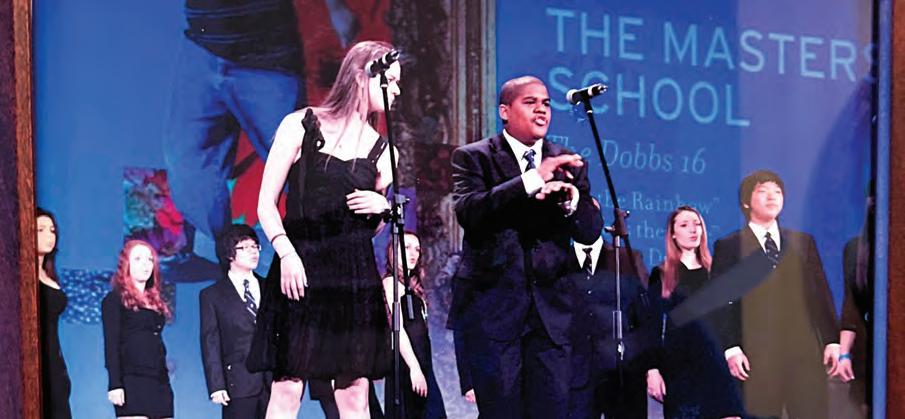
As a kid, Barry Eastmond Jr. ’08 loved listening to the radio and playing along on the drums.
And even when there wasn’t a radio nearby or he didn’t have drumsticks in his hands, he would find a way to tap out rhythms. “I was always banging on the dinner table, using my fork as I was making beats,” he said. “I naturally gravitated toward the drums.”
Given his percussive predilection, it’s no surprise that music has been the driving force throughout his life.
When Eastmond arrived at The Masters School in 2004, he was a drummer through and through. But with support from Gillian Crane, director of Dobbs 16, Eastmond began taking private voice lessons.

“Ms. Crane saw things in you that you didn’t see in yourself,” Eastmond reflected. His voice teacher, Andrea Saposnik, “really helped me to build my confidence and to make me feel like I can do this. I'm good. I have talent.”
Soon, he was singing with Dobbs 16 and Glee Club. Some of his favorite Masters memories are with Dobbs 16, specifically the group’s 2008 trip to China, where they performed at local schools and had impromptu street shows. “It was an amazing experience,” Eastmond said.
“I always felt like I had a home at Masters,” he reflected. “If I was just singing a song, people would join in. It made me so comfortable, and it helped me be
myself. Looking back, I didn't realize how amazing the experience was. I thought every school was like this. For the arts, Masters is a very special place.”
Eastmond even made his big-screen debut while he was a student at Masters. He and classmate Brooklyn Demme ’08 were in a band together; serendipitously, Brooklyn’s father, Academy Award-winning director Jonathan Demme, was directing “Rachel Getting Married” and needed a band to play a wedding song in the movie.
“We prepped a wedding song that we performed during the movie,” Eastmond recalled. “The next thing you know, we're on the movie set, and
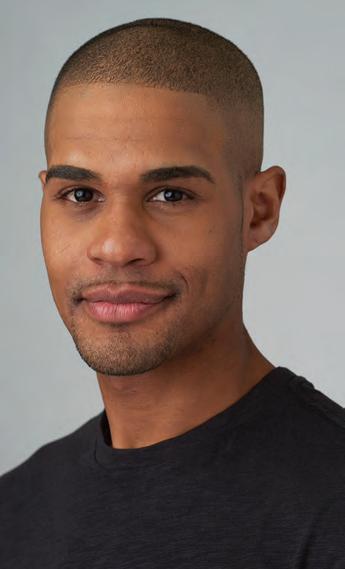
we're meeting all these actors. It was so cool, so amazing.”
In college, Eastmond continued to make music, and landed an internship at iHeartMedia, coordinating online programming for Elvis Duran and the Z Morning Zoo. He had always been a daily listener of the show, and as a musician, the gig was a dream come true. He met Justin Bieber and watched Blake Shelton perform during a lunchtime concert.
After college, he worked at various media and communications companies, but his heart never left iHeartRadio. “I always wanted to go back,” Eastmond said. “It was something I set out to do.”
That opportunity came in 2021.
Now, as senior research analyst for attribution and innovation, Eastmond does data and marketing analysis for all of iHeartMedia’s channels: broadcast radio, podcasts, digital
BELOW: After

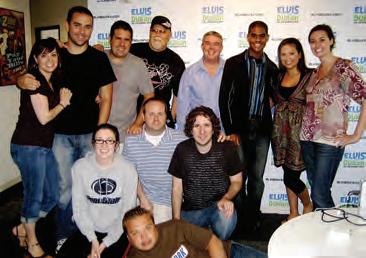
and social media. iHeartMedia is currently the number one audio company in the United States.
“I just love the fact that I’m around music,” he said. Eastmond hopes his work ”gets people excited to tune into the radio and to listen to their favorite songs, and gets them excited about new artists that are always popping up.”
The skills he utilizes in his job are some of the same ones he has always relied on as a musician: communication, collaboration and curiosity.
“I was always curious to discover different types of music, different types of artists and just different types of everything, like time signatures, like playing jazz, just challenging myself in different ways,” Eastmond said. “And I think that definitely translates to my role at iHeartMedia, because to find insights for these campaigns, you have to tackle them in so many ways. We use so many different methods to dig into data to try to find patterns.”

1. Hannah Weiss ’16 and Julius Rodriguez ’16 rock out to U2’s “The Joshua Tree” during their senior year performance in Great Gig.
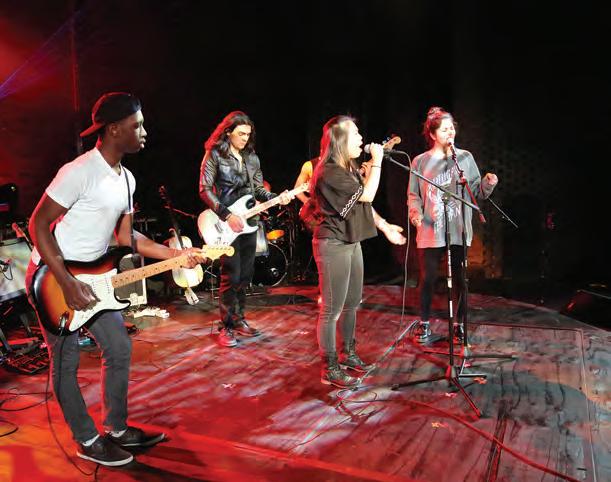
2. Great Gig faculty co-founders celebrate the performance of Beck’s “Odelay” in 2015. Jeff Carnevale, current dean of students, then theater technical director; Gilles Pugatch, upper school music teacher; Vince Galgano, upper school film and video media arts teacher; and Janie Wallace, middle and upper school theater and dance teacher.
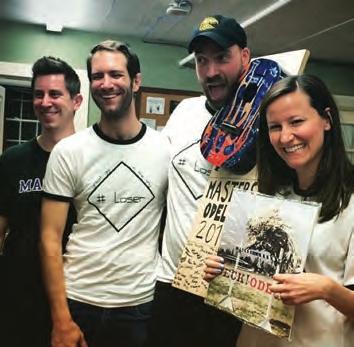
Its 12th
“The Great Gig in the Sky” Continues to Soar
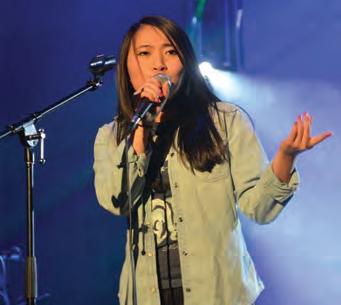
iteration of live, contemporary music on campus,” Pugatch explained. “As that grew, Jeff approached me and said, ‘Why don’t we do a rock production by harnessing that energy and doing it on a larger scale?’ He proposed Pink Floyd’s ‘The Dark Side of the Moon,’ and I thought he was nuts.”
Carnevale explained that his inspiration was a simple yet powerful idea: “What if we presented a whole album start to finish without breaks — as the artist intended?”

3. Weiss ’16 commanded the stage during her solo in Beck’s “Odelay” in 2015.
complex instrumentation, searing guitar solos and harmonious vocals, executing the album took a lot of practice both individually and as a group. Tech week the week before the show was harrowing, as it involved coordinating all the moving parts of the performance. When it came time to perform, it couldn't have gone smoother.”
From his early days as a fourth grade percussionist and high school band bassist to his work as a Broadway show musician and manager of an indie folk trio, upper school music teacher Gilles Pugatch has always had the music in him.
But it’s “The Great Gig in the Sky,” the School’s beloved annual music event he co-founded, that gives him the greatest joy as an artist.
This year marks the 12th anniversary of “Great Gig,” the interdisciplinary project in which some 80 student musicians and crew members produce a live performance and recreate an iconic music album in its entirety. Pugatch reminisces about its humble beginnings.
“Jeff Carnevale (current dean of students, then theater technical director) and I had been doing something called Band Fest, which was the first
Carnevale and Pugatch, along with then arts faculty Vince Galgano and Janie Wallace, presented the idea to students; in spring 2012, the first “Great Gig” took the stage. It was, by all accounts, a rocking performance in the Claudia Boettcher Theatre of Pink Floyd’s critically acclaimed 1973 album. They took the show title, “The Great Gig in the Sky,” from the fifth song on the album, as an homage to that first year’s performance.
According to Pugatch, Scott Collins ’12, a guitarist and vocalist at the time, was key to making that first production a success.Collins has returned to campus over the years to help guide current students in their Great Gig performances.
“One day in class Mr. Pugatch had us listen to the ‘Dark Side’ album, and it sunk in what an undertaking it would be,” Collins recalled. “With its
Sam Appiah ’12, now a music teacher in the Upper School, was there, playing keyboards and performing vocals. “It was an amazing experience,” he said. “It was my first time being part of such a large production and performing a huge volume of music. There was a lot of responsibility on us students to get certain things done, and I was proud to receive that kind of trust from my teachers.”
Carnevale said, “We intended to create an authentic experience for students, one they would find if they were doing a real concert or production and not just a school version of it.”
Over the years musicians from faculty-directed ensembles (Jazz Band, Contemporary Ensemble, The 1877: Band Edition) and student-directed groups (Positive Rhythm, 49 Clinton) have participated in “Great Gig.” For the past two years, middle school students (dubbed “The 8th Greaters”), led by middle school music teacher John-Alec Raubeson, have joined in on the act.

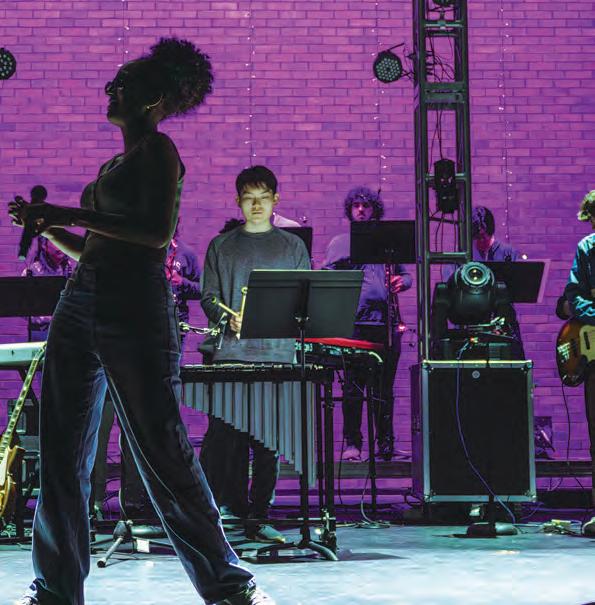
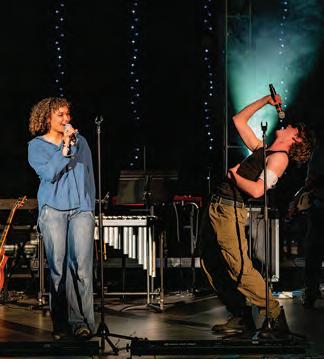
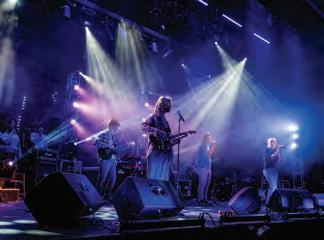
The albums that followed “The Dark Side of the Moon” were Michael Jackson’s “Thriller” (2013), Fleetwood Mac’s “Rumours” (2014), Beck’s “Odelay” (2015), U2’s “The Joshua Tree” (2016), Green Day’s “American Idiot” (2017), a “Best of Social Justice” compilation (2018), Led Zeppelin’s “Houses of the Holy” (2019), Marvin Gaye’s “What’s Going On” (2021), Pearl Jam’s “Ten” (2022), Lauryn Hill’s “The Miseducation of Lauryn Hill” (2023) and David Bowie’s “The Rise and Fall of Ziggy Stardust and the Spiders from Mars” (2024). While “Great Gig” was canceled in 2020 due to the pandemic, the Jazz Band did perform an audio recording of Joni Mitchell’s “Blue” on its own.
Julius Rodriguez ’16, an accomplished jazz musician with Verve Records, played drums, keyboards and guitar in three “Great Gigs.” He called it “one of the greatest preparations I had for the real-life music industry, hands down.
“It taught me how to learn music with a critical lens for the purpose of recreating — whether identically or maintaining the essence of — a song while inserting my own voice,” Rodriguez said. “It taught me how to collaborate with musicians of all skill levels. It taught me the importance of all of the pieces of a production that size. The practice of that kind of focus and commitment is priceless. Not to mention the musical and historical education I was getting every year.”
Hannah Weiss ’16, a music teacher and choral director at the French-American School of New York, got her musical start in fifth grade under the tutelage of Middle School Performing Arts Coordinator Katie Meadows. She fondly remembers that experience paving the way for her role as a vocalist in three “Great Gigs.”
“These days, a lot of us listen to playlists based on different genres or artists on streaming platforms, but rarely do we listen to an album in its entirety,” Weiss said. “‘Great Gig’ allowed me to appreciate the way artists tailor a compilation of songs to execute their vision, a purpose which can’t always be seen when we listen to a single song.”
Weiss especially enjoyed performing Fleetwood Mac’s “Rumours,” and credits “Great Gig” with bolstering her performance skills and confidence: “I learned that music class doesn’t have to be taught in the ‘old school’ method of presentations and research papers,” she said. “It can be creative and hands-on.”
During last year’s production of Lauryn Hill’s iconic 1998 R&B album “The Miseducation of Lauryn Hill,” vocalist Sienna Morin ’25 made her “Great Gig” debut performing “Forgive Them Father” and “Everything Is Everything.”
Live performances of these iconic albums have been featured in “The Great Gig in the Sky”
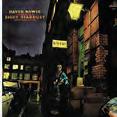
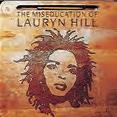
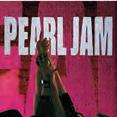
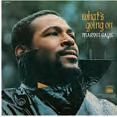
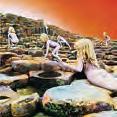



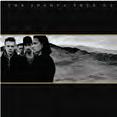
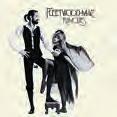

“I’ve always had a lot of stage fright, but when I was on that stage, all the nerves were gone,” she said. “Seeing my friends in the audience cheer and my family coming from Jamaica to watch me helped me to relax and be more excited to perform.”
Appiah said that it’s Masters at its finest: “‘Great Gig’ is the embodiment of ‘to gather.’ To see a ‘Great Gig’ production is to see Masters: its smile, its joy, its energy. ‘Great Gig’ isn’t only what happens on stage it’s also the students, parents, friends and faculty who show up, who gather in support of the efforts of everyone. There is no greater legacy to leave behind than to be a community.”

With unwavering determination and a shared love for the transformative power of music, three members of the Class of 2024 are ready to embark on the opportunities that await them post Masters.
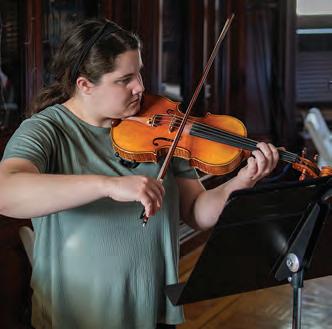
JULIANNE KORB ’24
Composer and Violinist

SHAZA MURIGANDE ’24
Vocalist
Composer and violinist Julianne Korb, an eight-year senior, graduates having her original work “Bloom” make its world debut at the Prism concert in March. The upper school String Ensemble performed the piece, which Korb describes as a waltz-like composition about the beauty and simplicity of spring. “It was a tremendous honor to have my work showcased in a concert that I have played in through my years at Masters,” Korb said.
Korb credits her time in the Middle School Orchestra and upper school String Ensemble and Chamber Music classes with nurturing her passion. This year she completed an independent study in composition with Curt Ebersole, upper school music teacher. “Mr. Ebersole inspired me through his positive attitude and his dedication to developing my interest in music,” she noted.
Heading in the fall to the University of Vermont to study music technology, Korb said she realized music wasn't just a hobby. “It’s something I wanted to pursue professionally,” she explained. “I see college as the perfect opportunity to hone my skills and immerse myself in a community of fellow musicians who share my passion.”
Vocalist Shaza Murigande ’24 knew early on that music was her calling. “From annual karaoke competitions in my hometown of Versoix, Switzerland, to writing and recording my own songs at age 12 and attending Berklee College of Music’s summer programs, I can't go a day without singing,” she said “That is why I decided to pursue music in college because I want to study something I love.”
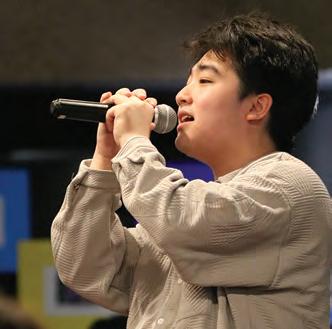
ZIHAO “HARRY” XIONG ’24
Vocalist and Clarinetist
Since freshman year at Masters, Murigande has been singing with choral groups Dobbs 16, Justice Choir and Dohters, with the band Positive Rhythm, and in Great Gig. “I have had such an amazing time singing with all the groups,” she said. “They have made my experience at school unforgettable.”
Murigande begins her studies at Berklee College of Music this fall and has a plan. “I’d like to learn the ins and outs of the music industry and how to produce my own music so that I can become my own boss,” she said.
Fellow vocalist and clarinetist Zihao “Harry” Xiong ’24, who calls Shanghai home, is excited to study musicology at UCLA. He says Department of Performing Arts Chair Jennifer Carnevale and her class in music and psychology inspired him to pursue musicology.
“Music will be one of the most important parts of my career,” he said. “My studies in college will allow me to explore cultures from around the world through music, as music has always been the universal language throughout history.”
Xiong’s love of music led him to the student-led pop/rock band The Reck. It was during The Reck’s performance at this year’s International Dinner, a popular event for the boarding community, that Xiong took a leap of faith.
“That was the first time I bravely took the step to sing on stage,” he said. “I would never have taken that step without encouragement from my friends. It was just like the mission statement of Masters that says we are here ‘to dare.’”

Starting this year, as part of the Our Might campaign, Strayer Hall will undergo an extensive renovation to modernize the building and enhance its classrooms and practice spaces.
Strayer Hall, named in honor of beloved faculty member Maude Louise Strayer, has been home to The Masters School’s vaunted music programs since 1955. Starting this year, as part of the Our Might campaign, Strayer Hall will undergo an extensive renovation to modernize the building and enhance its classrooms and practice spaces.
The renovation will create spaces in which those who are focused on music can excel and in which all students will benefit from exposure to music and the arts through learning, performance and collaboration.
The building’s interior will be revitalized with the creation of rehearsal spaces with modern lighting, a digital recording studio and acoustically advanced classrooms. Informal breakout spaces will allow middle and upper school students the opportunity to collaborate on music projects and assignments.
Exterior upgrades will enhance Strayer’s presence on the quad with a new outdoor performance space, giving members of the Masters community a place to gather to enjoy concerts, recitals and plays.
Jennifer Carnevale, chair of the Department of Performing Arts, is looking forward to “having facilities that match the historical, current and future excellence of music at Masters. The Strayer renovation marks an important turning point for Masters in designing a space with specific music needs in mind. I am really excited about the possibilities and opportunities created by the new building design.”

Our music faculty has ignited the passion of countless Masters students through their unparalleled teaching, directing, coaching, and yes, boundless patience. But did you know… ?
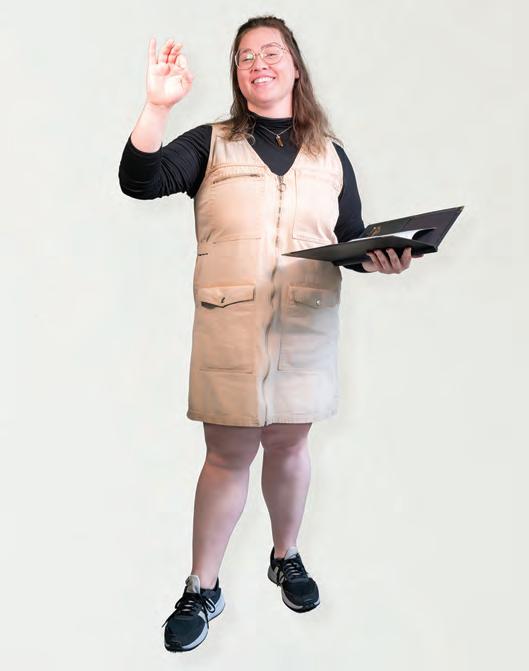
CHORAL MUSIC TEACHER
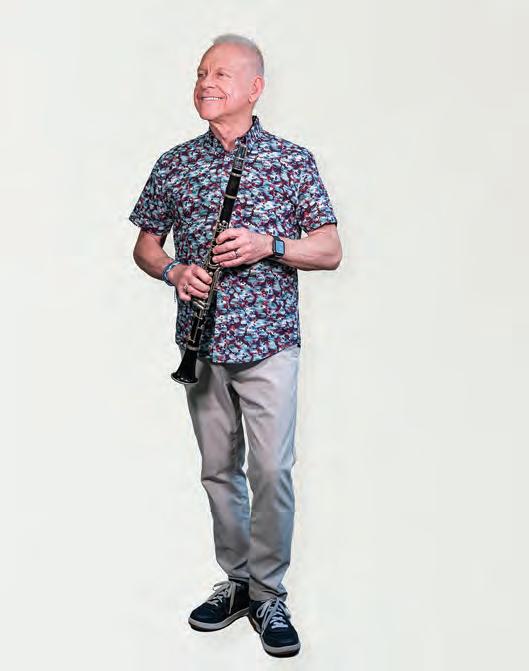
PERFORMING ARTS TEACHER
As part of my training as a conductor, I was required to learn how to play all the woodwind, brass, string and percussion instruments, plus piano. I can play “Twinkle, Twinkle, Little Star” on just about any instrument, but I only perform on clarinet, my first and primary instrument.
MIDDLE SCHOOL MUSIC TEACHER
While music is my main gig, I am also a professional cheesemonger, have traveled to Europe to visit cheese producers, and was the cheese buyer for the Bedford Cheese Shop in Manhattan.
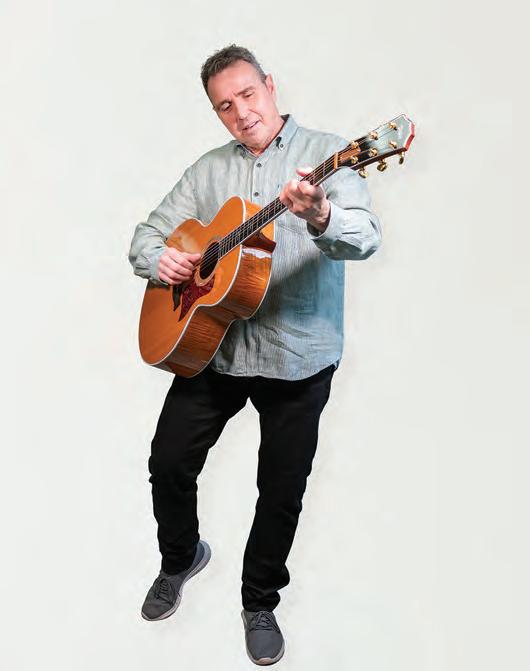
Since 1997 I have worked closely with Junoon, a band formed by a childhood friend from Pakistan. Through my work with Junoon, I have spent significant time in Pakistan and India creating some of the most popular music in that region.
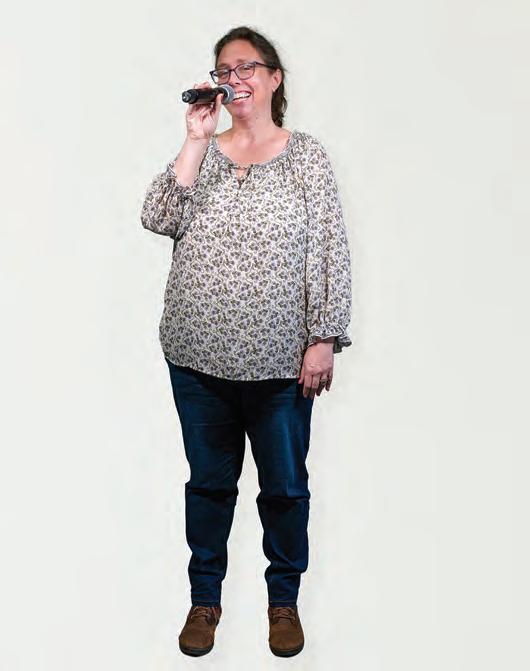
CHAIR, DEPARTMENT OF PERFORMING ARTS
By the numbers:
I have conducted the “Old Irish Blessing” at Graduation 10 times; I have taught 125 pieces of repertoire to Dobbs 16; I have introduced and taught 6 new courses; and have overseen the production of 55 full-school performances in 2023-24.
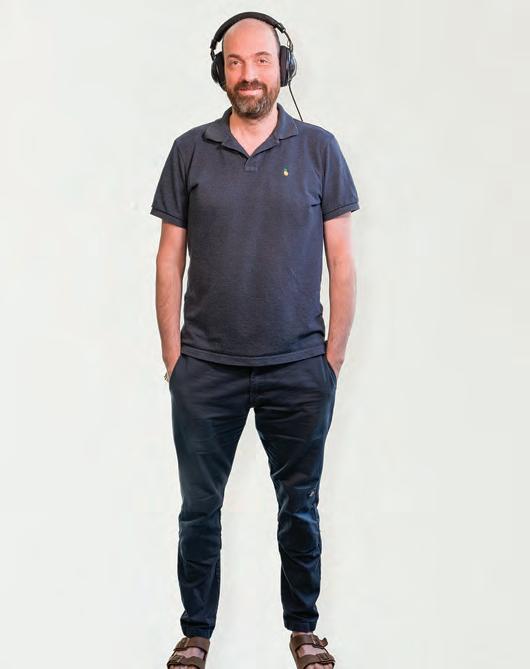
UPPER SCHOOL MUSIC TEACHER

UPPER SCHOOL MUSIC TEACHER
I also work as the music director for Darlene Love, an 82-year-old Rock & Roll Hall of Fame, Grammy Award-winning, platinum record-holding touring vocalist who’s worked with Sam Cooke, Elvis Presley, Dionne Warwick, Cher and Luther Vandross.
Phish is my favorite band.
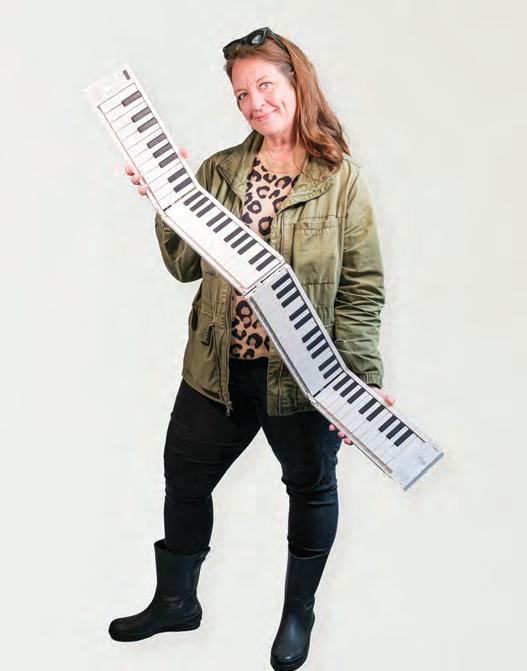
MIDDLE SCHOOL PERFORMING ARTS COORDINATOR
I fell in love with Stevie Wonder’s “Innervisions” in high school and remember the album taking my breath away. It got me thinking about the power of socially conscious music and challenged me to look at and think about the world in a different way.

When Charlie Milward ’24 thinks back to his freshman year on Masters’ varsity track and field team, participating in national-level meets wasn’t even on his radar.
“I think itʼs safe to say that there would have been no hope to compete at meets like Nationals or the Penn Relays,” Milward said. “Back then if you ran under 60 seconds in the 400 meters that was amazing and you were the best on the team.”
Like Bob Dylan sang, however, the times they are a-changinʼ.
The boys 4x400 relay team burst onto the national scene this past winter, qualifying for the prestigious Nike Indoor Nationals at The Armory in New York City.
“We haven’t had the opportunity before to compete at that level, and it was rewarding to see our hard work pay off,” said Brian Wolfson ’25. “I think the success is important because it shows the underclassmen on the track team that any goals are possible to achieve if you show up, work hard enough and believe in yourself. This year, it was a dream of ours and our coaches to run at Nationals, and we pushed ourselves as we practiced to achieve it. Excelling at any sport is meaningful to Masters’ ability to attract athletes for future classes because it shows we can compete with not only our rival schools but other schools in the country.”
Rest assured, Masters’ relay team wasn’t just happy to be there.
The squad which consisted of Milward, Wolfson, Nicholas Moutsatsos ’25 and Jake Mason ’24 — finished an impressive fourth out of 28 teams in the Emerging Elite Division, clocking in with a scorching time of 3:26.92. The performance bettered their previous school record by 3-plus seconds.
“We had all been preparing the whole season for this. We knew we had to make it count,” Moutsatsos said.
The Panthers slowly worked up to the record-setting time, turning in impressive effort after effort along the way. Masters qualified for the event with a time of 3:30.71 at the Ocean Breeze Elite Invitational. Prior to that, they placed second in the New York State Association of Independent Schools Championships with a time of 3:34.15.
It all built up to a massive crescendo at Nationals, as the squad ran the perfect race.
“All four of the relay legs executed their individual race strategy to perfection,” said coach Ian Mook, who doubles as an upper school math teacher. “We’ve been a team that rises to the challenge of the biggest stage at every opportunity we’ve had this season, and I think we all knew that in this moment, at this meet, we would find the strength to do something we would have once never thought to be possible.”
Masters’ secret weapon was sprints coach Hazem Miawad, a professional runner who competes for Egypt and holds the country’s record in the 600 meters. Miawad’s tutelage proved invaluable for the team.
“Haz instilled a belief in the sprints squad early on that they were capable of whatever they set their sights on,” Mook said. “As a result, for the first time in our program’s history, our athletes began the season with the goal of qualifying for Nationals.”
In addition, the Panthers boasted a deep roster of runners, forcing Mook to make tough decisions come race day. In addition to the aforementioned runners, Emmanuel Harris ’24, an alternate at Nationals, and Toby Freeman ’24 were also key pieces to the team’s success.
“There were more than four of us,” Milward said. “There were actually six of us competing for these spots. That competition kept everyone working hard and honest over breaks and weekends, and pushed everyone to be the best we could be.”
Looking ahead, Masters’ track and field program hopes to keep ascending while not forgetting where it came from.
“The national stage is definitely an exciting accomplishment, and it affirms a lot of the hard work we’ve already put in,” Mook said. “But I think it is essential that we maintain our underdog mentality. We are a program that is on the rise, and I want it to always feel that way. Our boys and girls track teams are only getting better, and I don’t want us to ever settle.”
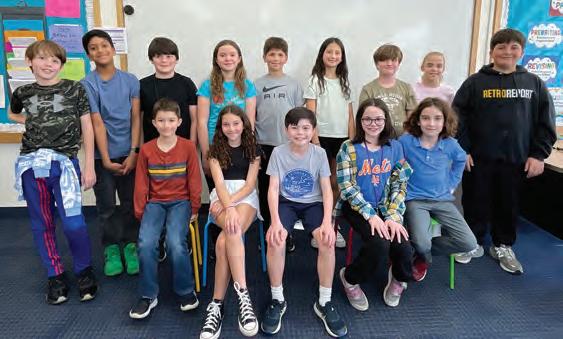
Michaela Boller’s fifth grade students have mastered the art of public speaking.
To Boller’s delight, the 14 students “poured their hearts into these speeches, and I was really proud of them for remembering to use SPATE (stance, pace, articulation, tone, eye contact),” she said. The students presented their speeches with confidence and grace on March 26.
The class addressed topics ranging from endangered giant pandas and saving bees to the dangers of smoking and vaping. “When they’re given the opportunity to speak freely and to share their opinion and I'm not telling them what to say, it gets them more excited about it,” Boller explained.
Shiv Padmanabhan ’31 interviewed a top neurologist at Harvard when researching ALS (amyotrophic lateral sclerosis), a disease that affects the nervous system. “I did my speech on possible solutions for ALS, my experience with ALS and how my grandpa was diagnosed with it several years ago.”
Classmate Isabella Roberts ’31 also turned to family when researching her topic on appreciating the elderly. “Studies show that if you're appreciating your elders, it changes their life perspective a lot,” she explained. “I asked a bunch of questions to my grandma about how she feels when she’s appreciated and how she feels when she’s not appreciated or disrespected.”
Inspired by his mother’s work in marine biology, Charlie McNamee ’31 dived into a speech about the importance of addressing ocean pollution. “I hope that people learn to throw their trash away, not use plastic water bottles, and maybe just help,” he said.
As he showed his hearing aid to the audience, Andrew Whaley ’31 spoke about his personal story of hearing loss: “I had just read the newest Percy Jackson book, and in it there was a really offensive stereotype about hearing loss, saying that all people who have hearing disabilities are old and that really hurt, so I wanted to correct all those misconceptions.”
Sparked by discrimination against the queer community, Elise Vargas ’31 gave a speech about LGBTQIA+ awareness and was proud of herself and her classmates: “I think everyone did very well with their SPATE, and I believe that a lot of practicing can go a long way. I practiced quite a bit.”
Boller knows her students will continue to benefit from this unit. “We are about to write an essay on ‘The Phantom Tollbooth,’ and I know the skills they used to write their speeches will help them for this next five-paragraph essay.”
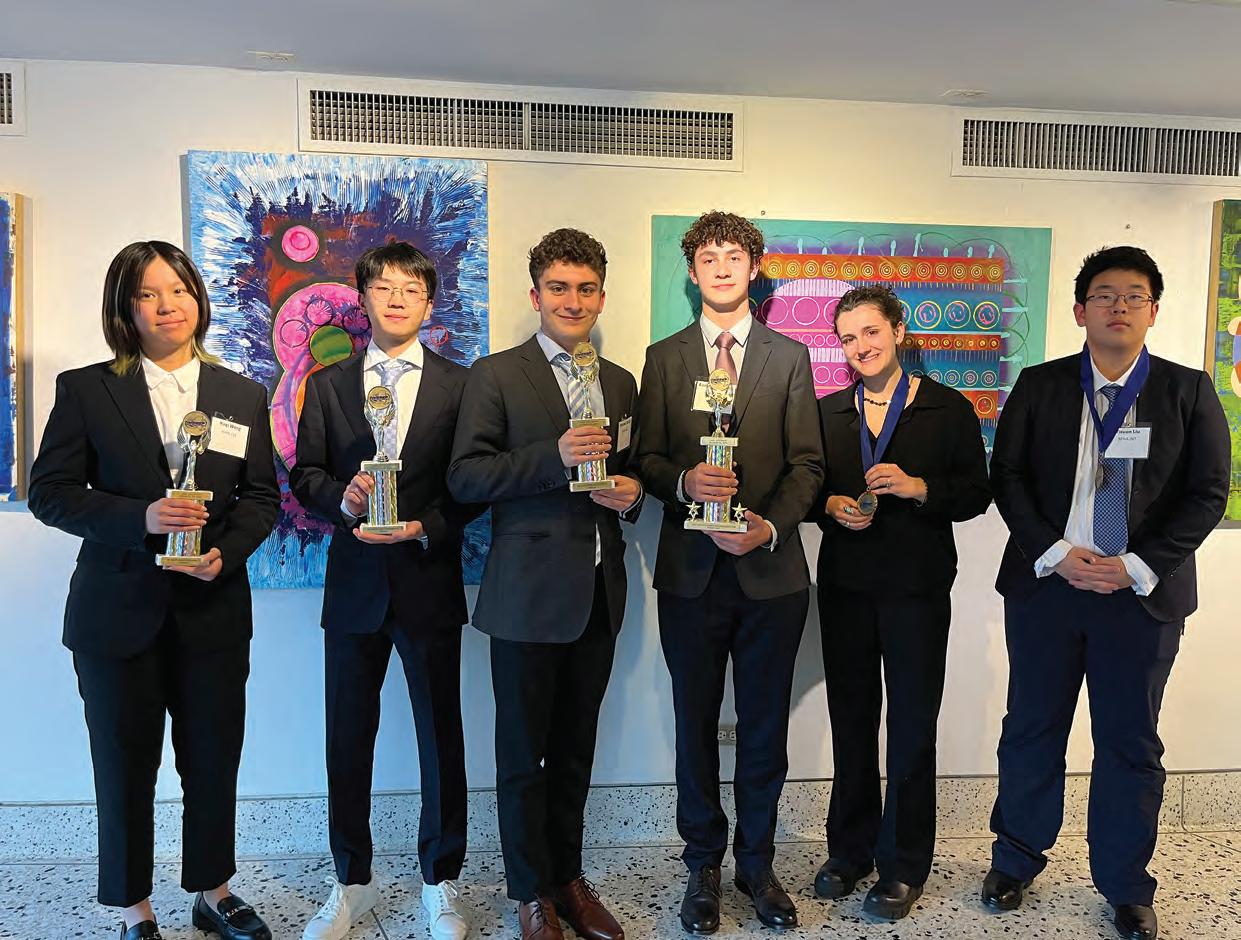
Upper school science students took home multiple awards this spring at two of the region’s preeminent competitions: the Regeneron Westchester Science & Engineering Fair (WESEF) and the New York State Science & Engineering Fair (NYSSEF).
“These students are truly amazing,” said Dr. Kristina Gremski, Science Research Program director and upper school science teacher. “I’m humbled whenever I think about everything they have achieved.”
Michael Stoica ’25 was drawn to his research topic, “A Novel Approach to Diagnosing Tree Diseases and Infestations,” when he saw infested ash trees being cut down in his neighborhood. “I knew I wanted to take action, especially when I realized there were no established tree disease detection devices that are affordable or usable on a widespread scale,” explained Stoica, whose work earned him honors in Environmental Science at WESEF and NYSSEF. “I spent my last two summers in the woods of Westchester searching for trees, taking measurements, and refining my testing system.”
Stoica and Jeremy Li ’25 advanced to the international GENIUS Olympiad, where they will present alongside students from 40 other countries in June at the Rochester Institute of Technology. Only 10 students out of the 714 at WESEF were named GENIUS Olympiad finalists.
“I was proud to represent The Masters School on the awards podium and be part of such a supportive team where everyone lifts each other up,” Stoica said. “I will continue expanding my research as well as mentoring the younger science research students to inspire that scientific motivation.”

After placing in the Physics and Astronomy category at WESEF and NYSSEF, Alyssa Wang ’25 spoke about the passion she had for her research on “Visualizing Compact Euclidean Topology.”
“I was very interested in the idea of higher dimensions, and the topology of a three-dimensional space always makes me think about the connection of our 3D space to these abstract ideas,” she said. “The fact that scientists have found a way to visualize them is fascinating and I want to dig deeper into how it’s done and create my own.”
Wang enjoys building connections with students from other schools at the science fairs and feels “more excited and encouraged about going into a career in science.”
The Science Research Program allows students to conduct an independent research project in a scientific field of their choice with the help of an expert mentor. They are then given the opportunity to present their work at the regional, state and possibly even international level, though Gremski maintains that “The main reason we participate in the fairs is not for the awards, but rather to give the students experience of what it is like to present their research in front of outside experts.”
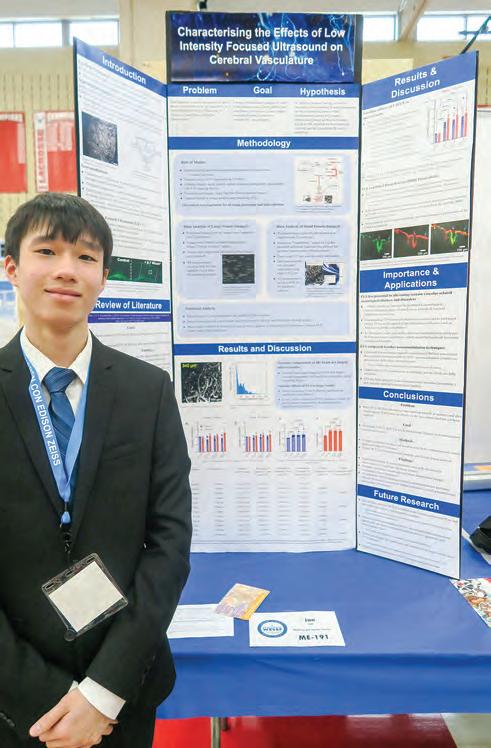
Upper School French Teacher 1997-2007
Bonjour, chers amis de Masters!
After departing from Masters in 2007 due to a decision to migrate north to Andover, New Hampshire, my husband, Pecco, and I began a new adventure as owners/innkeepers of the Highland Lake Inn, a historic (1767) gentleman’s farmhouse with 13 bedrooms with en suite bathrooms! Several years later, we restored the adjacent four-floor barn to save it from collapse, and we transformed this beautiful space into the Andover Barn, which serves as an event venue for weddings and celebrations. It’s been a real adventure, for sure, meeting so many interesting people from all over the world.
Simultaneously, I headed the world language department and served as the only French teacher at a public high school about 45 minutes away. Three years into the position, by necessity, I added Spanish to my teaching repertoire, after participating in an intensive immersion course in Spain to refresh my very dormant skills. What a blast that was! Among the highlights of my years of teaching in New Hampshire were the organization and implementation of successful student exchange and travel programs with high schools in France, Spain and Quebec. These exchange programs provided my students with enriching, life-changing experiences.
After the COVID challenges of teaching remotely and then partially in person, I decided to retire in 2021, ending a 45-plus-year career. Now I am thrilled to sleep later, to have time to go to a gym to exercise and swim, and to travel whenever I feel like it. Indeed, it has taken me a while to decompress and recover physically from my nonstop life of teaching and innkeeping! I’ve become involved in various town activities, particularly volunteering to edit and proofread the area’s newspaper, and I have just finished my first course at Colby-Sawyer College’s Adventures in Learning Program. Moreover, I’ve had a super time in the past two years reconnecting with friends and visiting family in Germany, Austria, Italy and Morocco.
My two sons, Pecco Jr. ’03 and Teddy ’05, are both gainfully employed, married and parents — they have given us the joy of being grandparents to two adorable grandsons (so far!). Pecco lives near Houston, and Teddy lives in Burlington, Massachusetts, a mere 1.5-hour drive away.
If any Masters folks should venture in my neck of the woods, lakes or mountains, please do stop in to say hello, or stay with us! We would be so happy to welcome you! gailsbeaufays@gmail.com or innkeeper@highlandlakeinn.com.

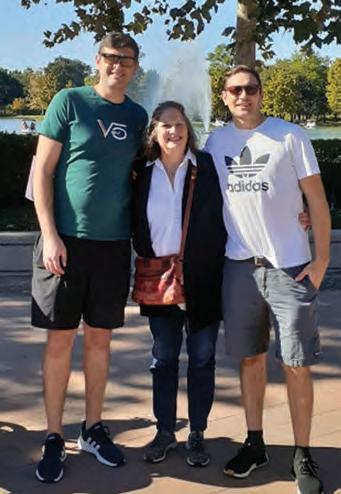
Gail Beaufaÿs and her two sons, Pecco Jr. ’03 and Teddy ’05.
Associate Dean of Students and Director of Dobbs 16 1998-2014

From the moment I stepped foot on campus as a wideeyed, four-year boarder in 1988 until my graduation in 1992, and then returning as a teacher in October 1998 until 2014, Masters has affected my life in the most profound ways imaginable.
Throughout my time as a student and a teacher, I forged lifelong friendships with fellow students and esteemed faculty members. I played volleyball with the legendary coach Ginger O’Leary O’Shea; discovered my passion for music under the guidance of Nancy “Doc” Theeman, the head of the Music Department; learned about good citizenship from the esteemed Priscilla Hindley ’66, former dean of students; and shared travel experiences with Dobbs 16 and Chris Frost, former head of upper school.
I fondly reminisce about the traditions that defined my time at Masters: Phi and Delta competitions, dorm competitions, and the circle song I started my senior year. Upon my return as a teacher, I had the privilege of working closely once again with Priscilla Hindley, whose wisdom and patience continued to inspire me. Leaving Masters in 2014 was bittersweet, but when I was choosing a new school, I decided to step out of my comfort zone and choose a place that would challenge me to continue to learn and grow. My journey continued at The John Cooper School in The Woodlands, Texas, where I serve as dean of students and assistant head of upper school.
While I have found a new home here, I am delighted to have had multiple connections with familiar faces from Masters, fostering a sense of continuity and community. As I reflect on my journey, I am reminded of the invaluable
connections formed within the Masters family — connections that transcend time and distance. To former colleagues, students and friends: I miss you dearly, and I encourage you to reach out and reconnect whenever possible. To current students: Cherish the bonds you form at Masters, for they will serve as pillars of support and inspiration throughout your life’s journey.
As I embark on this new chapter surrounded by the love of my husband, two stepchildren and our four poodles, I carry with me many cherished memories and enduring lessons learned at Masters — a place I will always proudly call my home.
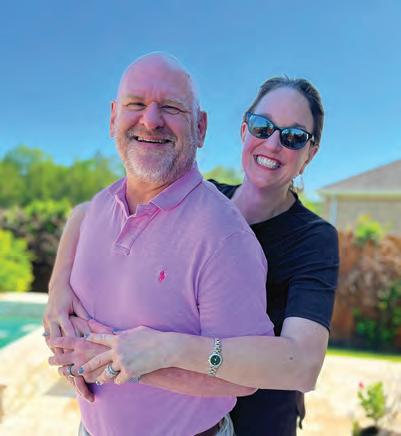
Gillian Crane '92 and her husband live in Texas, where she works as dean of students and assistant head of upper school at The John Cooper School.
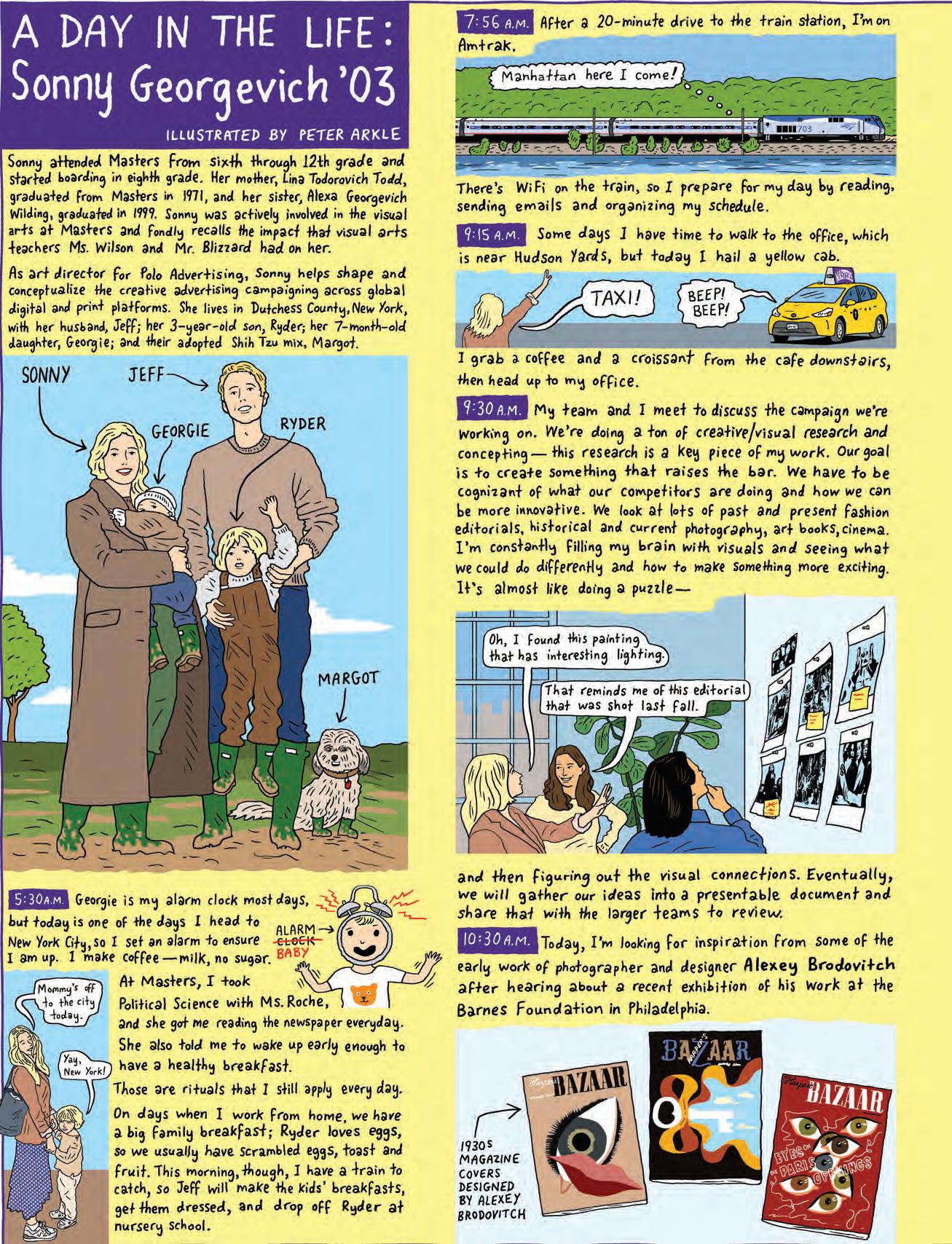
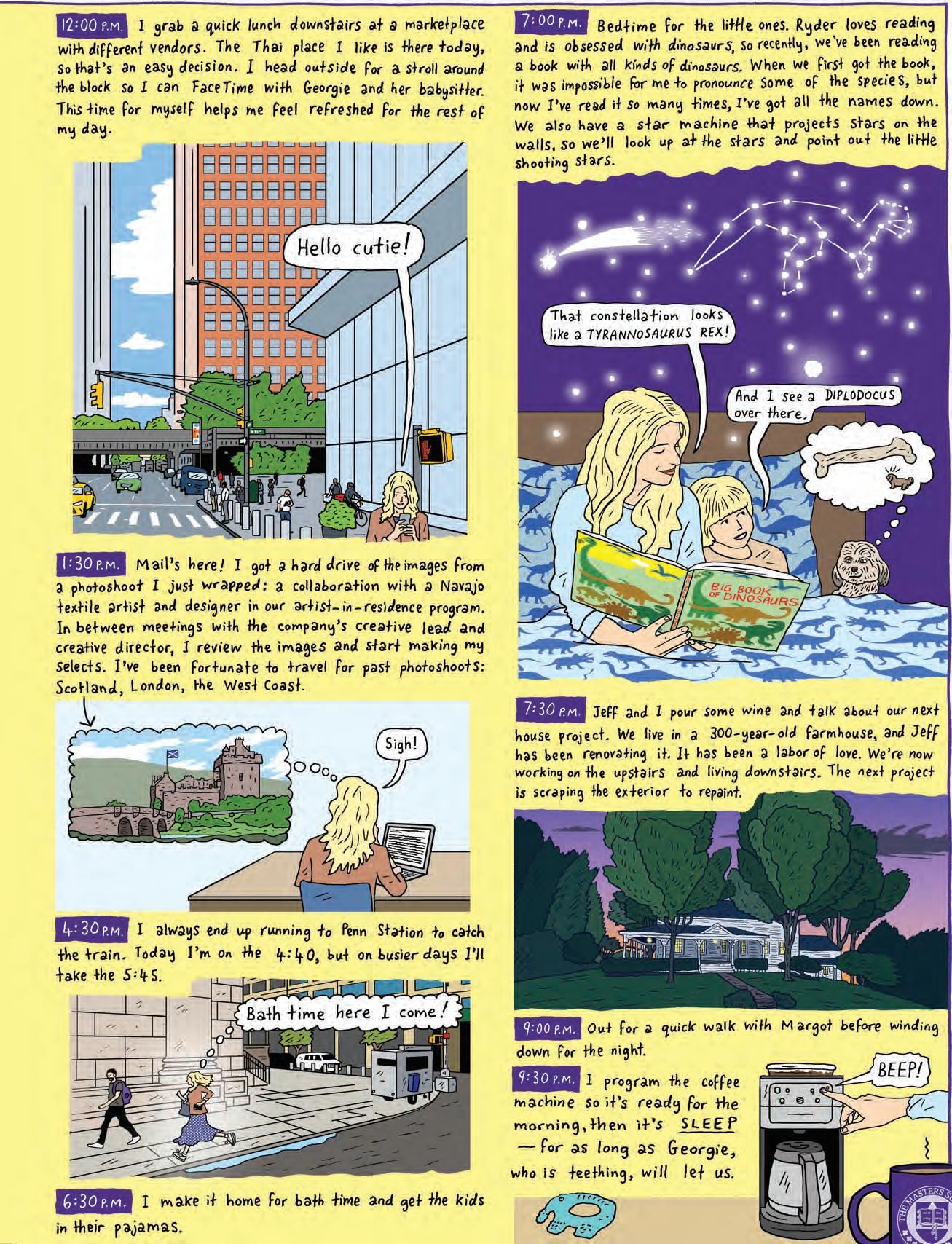
AN
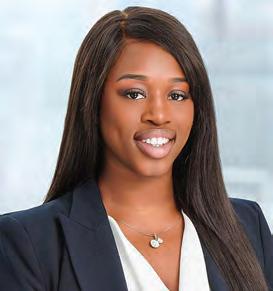
AFIA KWAKWA ’10
is an associate at Skadden, Arps, Slate, Meagher & Flom LLP, where she focuses on international litigation and arbitration. As a boarding student at Masters, Kwakwa was involved with Model UN and Ubuntu Education Fund, was co-chair of Community Government and a dorm proctor, played varsity field hockey, and volunteered at Andrus Nursing Home. In recognition of her contributions to the Masters community, Kwakwa received the Gillespie Bowl her senior year. She earned degrees from Brown University, Columbia Law School and Sciences Po Law School (Paris).
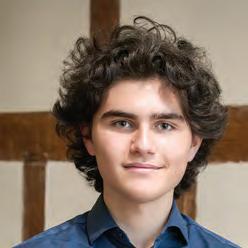
GABRIEL TOMAJKO ’ 24 joined Masters in tenth grade and decided to board his senior year. He lives in Thompson Dorm, plays on the tennis and golf teams and interns for New York State Assemblywoman Dana Levenberg.
Why did/do you want to become a lawyer, and what/who inspired you to pursue this career?
AFIA: I always enjoyed advocacy, and during my studies I developed a profound interest in social justice. During university, I did a lot of volunteer work and had several tutoring jobs in local schools. After university, I taught high school math in Mississippi, and my passion for advocacy and speaking out for those who did not have a voice grew even more. These activities piqued my interest in finding a field where I could learn about people from different cultures, while also arguing for structural change that promotes equality and opportunity. This is where I found my passion in teaching, and it is also what led me to practice law.
GABRIEL: When I was 12, I received a book written by my great-uncle about his life. He grew up in Austria during the Holocaust, and he had to flee to Shanghai. He finally made it to America and pursued becoming a lawyer. In the book, he described wanting to become a lawyer because he wanted to give back to the country that gave him safety and refuge. He also went into the Army — the JAG Corps (U.S. Army Judge Advocate General’s Corps). That story was inspiring.
What area(s) of law interest you?
A: I love international law. I have always had a passion for learning about different legal systems and understanding how cultures impact those systems. I grew up in Switzerland, have a Ghanaian and Ugandan background, and moved to the U.S. when I came to Masters — so my mixed background fostered my interest in international legal systems.
G: I’d like to be a public defender, to help people who may be down on their luck or who may not have the same advantages as others.
What do you think is the most challenging part of practicing law?
A: The fast-paced environment; it requires learning a lot of new information and applying that information at a relatively quick pace. This is also what makes practicing law exciting! Every month, I learn new skills, research new case law, and/or face new roadblocks. No case procedure is the same, and every set of facts is unique — and that requires constant on-thejob learning. With every challenge comes an opportunity to become a better problem-solver and a better lawyer.
G: From what I’ve heard, it’s the hours and the work you have to put in. It’s quite timeconsuming and really an endeavor — up to 80 hours a week or perhaps even more. You’d have to sacrifice quite a bit of social life to pursue such a career.
What do you believe are the characteristics that every successful lawyer should possess?
A: Curiosity to learn, hard work and empathy.
G: Hardworking, studious, and willing to accept a losing position and working from there. You have to be willing to dedicate a big part of your life to it and make that commitment.
Who is your role model?
A: My parents. They are the kindest people I know, and I aspire to be like them. They worked tirelessly to give their children great opportunities, and they always imparted the importance of education. I have to give them all the credit for the constant encouragement that kept me going through Masters, university, law school and now, the practice of law. My father is an international lawyer and has also been an educator for a long time and is very passionate about teaching law to his students.
G: My mother. She’s a social worker, and I’ve gone with her a few times to her job. You have to be quite dedicated. You have to care for people who, sometimes, are angry, are bitter about their situations, and are in pain.
How can the field of law be used as a power for good?
A: When you become a lawyer, you gain the privilege of learning how to navigate a system that can be hard for many to understand. I think it is every lawyer’s duty to use that gift to do good. The legal field needs people who are invested in their communities and people who are inclined to reinvest in those who are less fortunate than themselves. I enjoy taking on pro bono clients seeking asylum in the United States.
G: The work I’m trying to focus on, being a public defender, you’re very much being a power for good in the world because you’re helping somebody who can’t afford a lawyer and is in a situation in which they need one. You’re helping somebody who deserves representation and a fair trial.
Favorite class at Masters?
A: This answer is nearly impossible to narrow down:
1) Algebra II with Mr. Kammrath. Mr. Kammrath made this class so dynamic, and I enjoyed every day. I also have to credit my love of math to Ms. Van Brummelen, my teacher and my dorm mom, so the math help was always available at home. I went on to teach high school math after university, and it was definitely thanks to the incredible experience I had while learning math at Masters!
2) English with Mr. West. Lawyering is all about reading, analyzing and writing. I
did all of this in Mr. West’s English class. He helped us develop our love for critical thinking and analysis, and he helped foster my love of writing.
3) Public Speaking and Theater with M.A. Haskin. Ms. Haskin was a commanding force on the stage and an incredible teacher. My love of theater grew so much at Masters that I chose it as one of my majors in university.
G: Political Science with Ms. Roche. It’s the only class I like taking tests in, which is quite a rare occurrence. I have fun in the class, answering questions, learning about politics and the political environment. I find it fascinating, especially for what I’m interested in. I go in there every day, and I talk about something I really enjoy.
What is your fondest memory of Masters?
A: Life in the dorms! I loved being a boarding student and being a dorm proctor (shoutout to Ford). My time at Masters allowed me to foster lifelong friendships, and I cannot thank the dorm parents enough for their tireless work. Moving from Switzerland to New York at 14 was quite a big move, but the Masters community made it so easy. I will never forget Ms. Carnevale as a dorm mom and discussing my classes with her. For us international students, it is impossible to forget the many languages Monsieur Simon and his daughter were able to speak.
G: I just started boarding this year, and the Community Dinner was quite spectacular — being able to see people presenting and sharing their talents. Just being with the community and feeling that you're part of it. I just thought it was what Masters stands for.
Best advice you’ve ever received?
A: It’s okay to say “I don’t know” when you do not know. Recognizing areas for improvement is part of learning and part of life.
G: Lay out your clothes for the next morning every night before you go to bed. I found that helps me get going because, not only do I not have to wake up and look for a pair of pants, but it also gets me in the right mindset for tomorrow, the day before. It gets you focused on the day to come and to dress for what you're going to be doing that day.
Favorite courtroom drama TV show or movie?
A: So cliché, but I love “Suits”! My favorite law-related movie has to be “Separate but Equal” — I have always admired Thurgood Marshall and the efforts he made to improve inequality and education inequity in the United States.
G: “Better Call Saul”
1. Celebrating 70 years of memories were (left to right) Lee Masselman Kallos, Heidi Slater, Magnhild Wollheim Sandberg and Mary Anne Groves Carley from the Class of 1954.
2. Representing the mid-aughts were Jodi Innerfield ’05, president of the Dobbs Alumnae/i Association Board, and Andy Finkelstein ’04.
3. Opeyemi Alabi ’09, left, and Alex Martin ’09, right, spent time with the faculty member who inspired them to study medicine, upper school science teacher Elisabeth Merrill.
4. Head of School Laura Danforth, left, and honorary trustee Lynn Pilzer Sobel ’71, P’99, ’05 enjoy the Jazz Brunch at Estherwood.
5. Old friends Sara Kaplan Smith ’99 (left) and Dorothy Walsh Sasso ’99 look stylish in new Masters merch.
6. Upper school history/religion and journalism teacher Ellen Cowhey is delighted to welcome former students back to campus.
7. The Class of 2019 turned out to cheer classmate Vittorio Stropoli, center holding sign, the 2024 recipient of the Maureen Fonseca Young Alumnae/i Award.
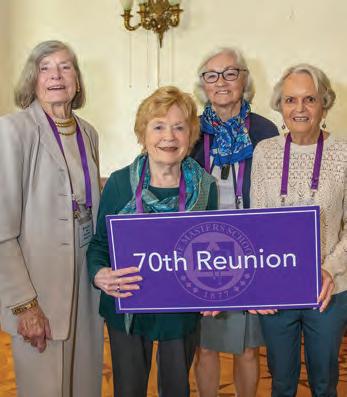
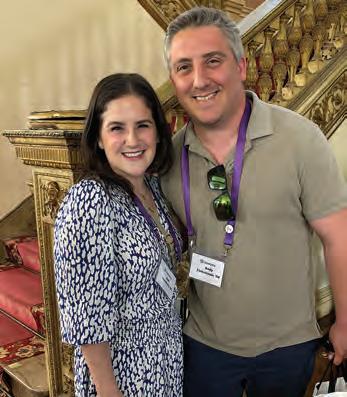
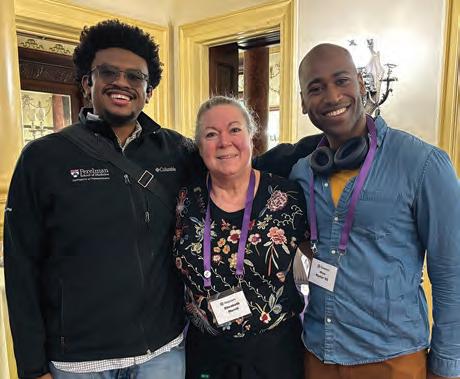
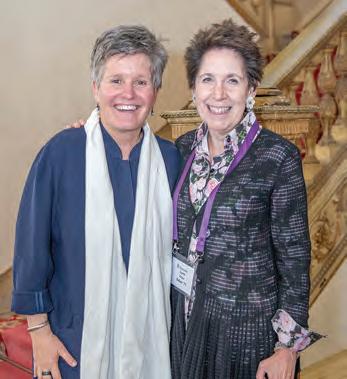
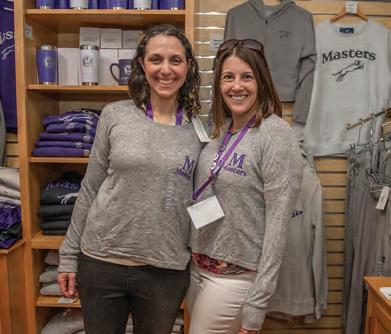
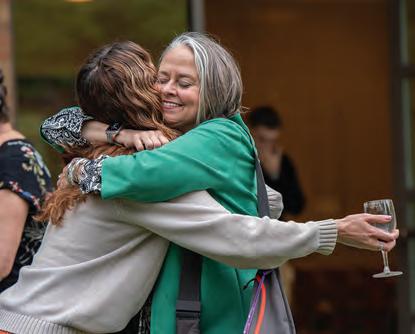


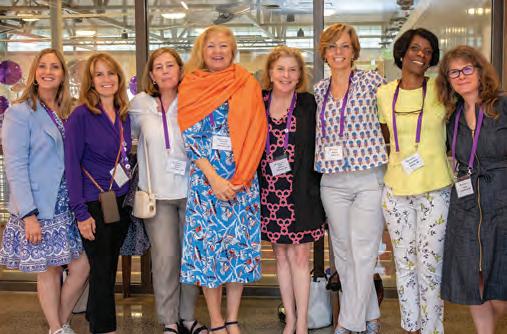
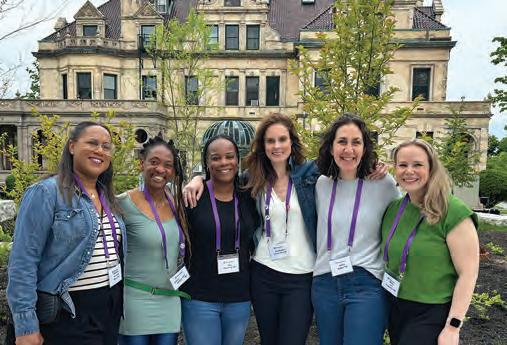
8. Happy 20th to the Class of 2004. Left to right: Tanya Welsh Koshar, Brian Pugh, Dobbs Alumnae/i Association board member and 2024 Richmond Bowl recipient Natasha Bansgopaul, Larry Carpenter and Jess Hippolyte.
9. 50 years and counting! Members of the Class of 1974 had a golden reunion. Left to right: Carolyn Kalisch Lundberg, Diane Pappas-Sfedu, Nina Doyle Wilson, Jill Lewis Odel, Schatzi Puckhafer Brown, Nini Gridley, Alison Krafft Rempel and Maureen Richards.
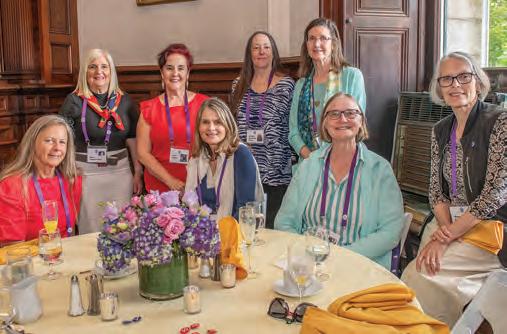
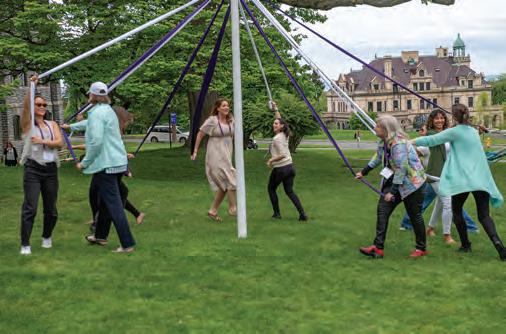
It is tradition at Reunion to honor members of The Masters School community who have distinguished themselves through service to the School, to its students, and to the world outside Masters. Congratulations to the following award recipients.
The Eliza Bailey Masters Fellowship Award Sharon Nechis Castillo ’84
10. The Class of 1984 was well represented at Reunion 2024: Left to right: Gretchen Gutstein Alter, Chris Grim Neikirk, Jenny Meyer Cunningham, Valerie Grulich Thompsen, Cole McKenry Johnson, Ondine Appel, Charlotte Moore and Clare Levy Strom.
11. Dancing ’round the Maypole — a tradition that never gets old.
12. On a tour of campus were friends from the Class of ’99 (left to right): Marlena Burroughs Stout, Ashni Massiah, Joy Manning, Stephanie Junger-Moat, Anna Sobel and Haley Haft Pagnotta.
The Anna Howe Faculty Award Cheryl Hajjar, upper school visual arts chair
The Richmond Bowl Natasha Bansgopaul ’04
The Maureen Fonseca Young Alumnae/i Award Vittorio Stropoli ’19
I was born in a village near Le Mans, France, in October 1932. The Second World War started in September 1939, and Germany occupied France in the spring of 1940. My village was liberated by American soldiers on 7 August 1944. (We were expecting to be liberated by British troops; if that had happened you wouldn’t be reading this.)
I was 11, and I was about to fall in love with America.
In two days, a U.S. Air Force base was built a few miles from my village. My father was the village doctor and mayor. He had daily contact with the U.S. forces and invited the pilots into our home for meetings and meals. I was suddenly surrounded by vibrant, brave, friendly, generous young pilots who gave me dried bananas and Fanny Farmer chocolates from Cleveland, Ohio. In the three weeks that the base was operational (they moved on quickly, ever closer to Germany). I made many friends in the 406th Fighter Squadron.
Four years later, I applied for a scholarship to study in the U.S. for a year. You can guess the rest.
After a nine-day Atlantic crossing on the M.S. Oregon, I landed in New York City. I arrived at Dobbs on the last Saturday in September 1948.
It was pitch dark, past 8 o’clock, when I got off the train. Somebody from the School came to guide me to my new home: Cushing House, home of the juniors, at the top of the hill. We climbed up and up forever, it seemed.
I was greeted by a mixture of shrieks and friendly questions: “Where are you from?” “Are you hungry?” “Would you like a peanut butter sandwich?” My English was pretty
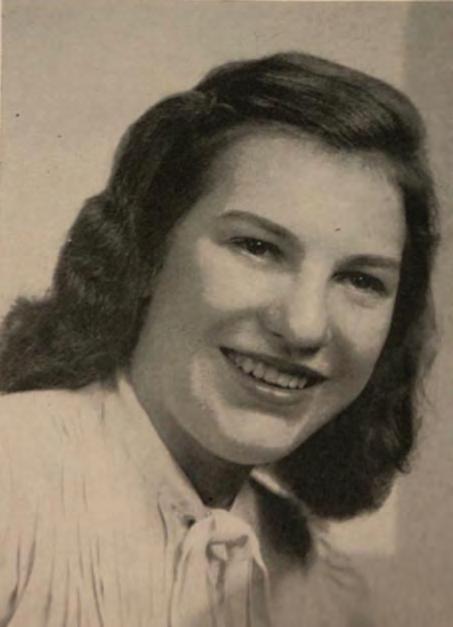
good, but not sharp enough to reply to all the questions — and I didn’t know what peanut butter was!
Mrs. Girdwood, the matron, intervened: She had a set of spare clothes for me, including the school uniform. (It would take me some time to learn how to knot the blue scarf that was the signature of the school uniform.) Then it was time for lights out.
Waking up the next day I found an envelope on my desk. Inside was a note from Mrs. Speer, the headmistress, inviting me to tea at Estherwood that afternoon.
Throughout the year, Mrs. Speer treated me with great kindness and understood my position as a young girl in unfamiliar surroundings. In an act of particular generosity, she presented me with my Dobbs ring on graduation day; she had commissioned and paid for it herself.
On arrival, I was surprised and delighted to learn that I could, within reason, choose my own subjects. Keen to learn as much as possible about the country I was a guest of, I chose American History and American Literature.
The history course was particularly interesting, introducing such concepts as “the frontier.” (Until then I thought a
frontier simply meant a line dividing two countries.) Chemistry was taught (by Miss Bangs!) in a very hands-on and entertaining way: lab and experiments first, followed by theory to explain what we had discovered.
Bible Studies was compulsory, and I found the Old Testament fascinating. The way it was taught opened up a world of literary references and philosophical concepts. This was typical of Dobbs, where the strictly academic side of education was always accompanied by a search for what lay behind the subject and for open and original content and exchanges.
In addition to the classes, there were also regular talks with guest speakers, such as a United Nations representative, the head of the Congregational Church of the United States, and a professor of literature from Pennsylvania State University.
1948 was an election year. The school organised a mock election campaign, with girls representing the presidential candidates and campaigning for office. At Dobbs, unlike in the rest of the country, Thomas Dewey came first by a big majority.
At daily assemblies, Mrs. Speer spoke to us about affairs both local and international, commenting on the Marshall Plan and the reconstruction of post-war Europe. She actively encouraged pupil participation in the Student Council. I had never experienced such a democratic and participative approach in schools in France.
In November 1948, a senior in Thompson House approached Mrs. Speer. This girl, whom I didn’t know at all, thought that I should get to know the “real” America outside Dobbs and that the two weekends leave per term and the two hours off campus each Saturday morning were completely inadequate for this to happen.
Mrs. Speer’s reply: “My dear Joan, why don’t you start by showing her as much of the real America as you can yourself?”
Joan Gillespie ’49 (known to all as Jay) did precisely that, inviting me to supper on Friday evenings. Thus began a friendship that changed both my life and my outlook on life.
In February 1949, when I was promoted from junior to senior, I moved from Cushing to Thompson and shared a room with Jay. We spent hours and hours discussing not just our daily lives but our experiences, our outlooks on life and our hopes for the future. The moment that best defined Jay was when she controversially attended a New York Herald Tribune youth meeting entitled “The World We Want” instead of the May Ball Weekend at Yale.
She went on to work for the State Department, then resigned as she found it too restrictive. She worked as a journalist for The New Republic magazine and covered the Algerian Civil War before falling ill with hepatitis and dying at the age of 28. I received the news in a letter from Mrs. Speer; 10 years on from Dobbs, she remembered my friendship with Jay.
I returned to France after graduating, and the world that I discovered during my year in America dominated my choices from then on.
I attended Sciences Politiques University in Paris while working part time for the American Field Service in the Paris office. As a postgraduate student, I went to Germany, where I met an English postgraduate student with similarly internationalist views.
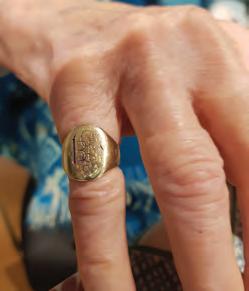
We were married in 1957.
I taught French and French politics in U.K. schools and universities. I returned to the U.S. for four months and worked for the American Field Service in the Washington, Detroit and New York City offices. I taught French at Harvard for a year and a summer school course at Cornell.
The greatest legacy of my year at Dobbs has been a lifelong love for America and for the friends I made. I have made countless visits over the years, including to my first American friends from the 406th.
My year at Dobbs transformed me. I had been a rather timid girl; Dobbs taught me how to make my own decisions, how to take risks, and how to weigh up different options. On my return to France, my mother came to fetch me from the boat. She pointed out her daughter to another waiting mother, who said, “You mean that American girl?”
Change indeed.
I still have my Dobbs graduation ring, given to me by Mrs. Speer, on the little finger of my right hand. 75 years on and still going strong.
To sum up the experience of a 15-year-old girl travelling to America from post-war, postoccupation France, with its hardships and scars (physical and mental) which would take years to heal: It was like living in Technicolor after growing up in black and white. I’ve been living in Technicolor ever since.
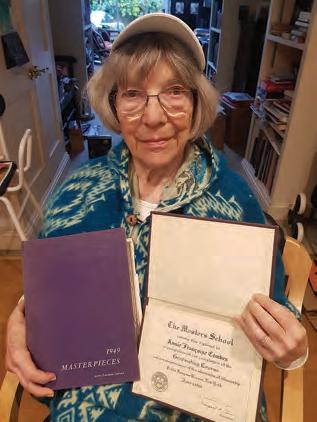
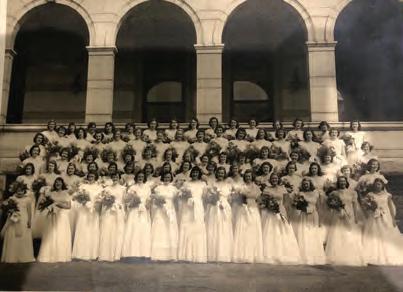
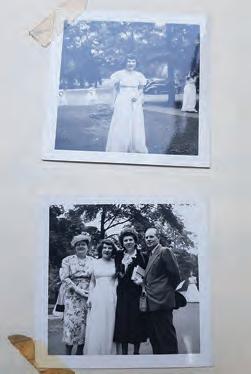
1: 75 years on, Morgan still wears her Dobbs ring, gifted to her by Mrs. Speer, the headmistress.
2: Morgan holds her 1949 yearbook and diploma.
3: After graduating, Morgan returned to France but maintained her ties to America with countless visits.
4: Morgan pictured on her graduation day.
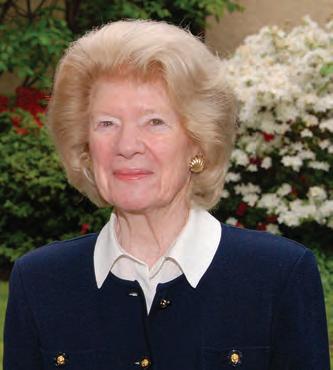
a devoted alumna and former trustee, died on November 30, 2023. She was 94.
Elise was an extremely active and engaged Masters volunteer, serving as a member of the Board of Trustees from 2009 to 2015. She lent her time and talents to a number of committees over the years, including the Estherwood Society and the 2010 Gala Committee. She was instrumental in fundraising efforts for the Masters Advantage Campaign, Greene Family Field and the Maureen Fonseca Center for Athletics and Arts. In recognition of her exceptional service and unflagging dedication to her alma mater, Elise was awarded the Richmond Bowl in 2012.
Known for her no-nonsense approach and quick wit, Elise was a quintessential “Dobbs girl” who served her school until her final days, leading by example with her generosity and hardworking spirit.
Her love for the arts, rich cultural scenes and the world of design defined her leisure pursuits. An avid theater-goer and voracious reader, she found joy and inspiration in the creative expressions of others. Her deep-rooted belief that travel is a great educator led her to explore more than 30 countries across five continents.
She is survived by her son, Peter; her daughter, Lisa; and two grandchildren.
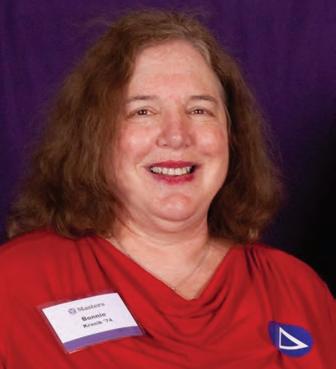
died at the age of 67 on October 12, 2023.
Bonnie’s television career spanned more than 30 years. She held positions as producer, on-air anchor and reporter in a number of cities, including Southfield, Michigan; Oklahoma City and Lexington, Kentucky. While at WLEX-TV in Lexington, Bonnie served as a morning news anchor, a medical reporter and a member of the management team.
A 1978 cum laude graduate of the University of Michigan in Ann Arbor, Bonnie began her broadcast career at small radio stations in the Monongahela River Valley of western Pennsylvania and began her TV news career at Channel 9 in Steubenville, Ohio.
She had credited her Masters theater teacher with her success in broadcasting. “Despite my teenage dream, I chose not to become a professional actor,” Bonnie said. “I went into television news broadcasting which combined Mrs. (Libby) Packer’s influence as well as that of my excellent English teachers. Thanks to her, I became an anchorwoman and reporter for many years, as well as an executive producer.”
Bonnie is survived by her brother, Rawley; her sister, Ellen; and a niece and nephew.
The Masters School notes with regret the passing of the following members of the extended Masters School family.
Brigitte Viederman
French teacher, 1983-1989 November 2023
Mary H. Silk Wife of Hugh Silk, former European history teacher and Head of School from 1971-1980 October 6, 2023
1930 s
Helen Emerick Stacy ’37 December 29, 2023
1940 s
Jean Lewis Paul ’41 2023
Miriam Camp Niederman ’44 January 31, 2024
Eunice Powell Grover ’41 October 8, 2019
Marianne Luckett Shaw Blanchard ’46 September 30, 2023
Susan Stone Slater ’47 January 22, 2024
Edith Debevoise Hustvedt ’49 October 21, 2023
1950 s
Anne Thorndike Cover ’53 December 2, 2023
Linda Hart ’53 March 3, 2024
Mary Rapp Flynn ’55 February 15, 2022
Ann Moulton Lee ’56 September 30, 2023
Judith Fuller Gillan ’56 May 24, 2020
1960 s
Marilyn Rooney Clement ’60 January 29, 2024
Jeanne Gorrissen ’64 September 24, 2023
Sarah Gray Markesky ’64 February 28, 2024
Beth Barbour Cocchiarella ’66 September 23, 2017
Gloria Etzbach Garvey-Hanington ’67 April 23, 2024
1990 s
Ryqui Monk ’91 February 3, 2024
Margaret Carhartt McHenry ’98 April 17, 2024
2000 s
Antonia K. Czinger ’09 December 21, 2023
2010 s
Hayley A. Kohn ’14 August 26, 2020
THE MAGAZINE OF THE MASTERS SCHOOL
Laura Danforth Head of School
Meredith Halpern Associate Head of Strategic Communications
Isaac Cass Digital Communications Manager
Christina Ha Communications Associate
Jen Schutten Associate Director of Communications
Design: KBWhite Communications LLC
Seth Marx Associate Head for Institutional Advancement
Judy Donald Advancement Associate
Hilary Finkelstein Director of Annual Giving
Sydney Hummel Advancement Assistant
Carol Maxwell Senior Manager, Engagement and Major Gifts
HEAD OF SCHOOL
Laura Danforth
BOARD OF TRUSTEES
Beth Nolan ’69, Chair
Allison Moore ’83, P’17, ’19, ’24, Vice Chair
Katherine A. Henry ’94, P’25, ’29, Treasurer
Dana W. Oliver P’22, ’25, Secretary
Asema Ahmed ’96
Rajay Bagaria P’25
Sara Barek P’27, ’29
Laura Danforth
Michael Greene P’10, ’13
Jodi Innerfield ’05
Ronen Israel P’23
Christina Masters Jones
Philip Kassen
Susan Katzke P’24
Stacey Lacy ’93
Zhifeng Li P’22
Steve Marlowe P’23, ’23, ’25
Edgar M. Masters H’98, Life Trustee
Susan Follett Morris ’57, Life Trustee
Rajiv Ratan P’22, ’24
Jonathan Resnick P’26, ’29
William Roberts
Tracy Tang ’80, P’18
Mirna A. Valerio ’93
HONORARY TRUSTEES
Marin Alsop ’73
Cynthia Ferris Evans ’52, P’76, ’86
Jeannette Sanford Fowlkes ’58, P’87
Ruth Mitchell Freeman ’51
Nancy Maginnes Kissinger ’51
Claudia Boettcher Merthan ’51
Lynn Pilzer Sobel ’71, P’99, ’05
DOBBS ALUMNAE/I ASSOCIATION BOARD
Jodi Innerfield ’05, President
Lucas Buyon ’11, Clerk
Natasha Bansgopaul ’04
Sharon Nechis Castillo ’84
Liza Ciaramella ’07
Austin O’Neill Dunyk ’98
Kathryn Taylor Harvill ’95
Victoria Love ’88
Vincent Madera ’05
Charles Mendelson ’03
Justina Michaels ’02
Hannah Miller ’10
Ricardo Oelkers ’03
Greg Pasternack ’05
PARENT ASSOCIATION EXECUTIVE COMMITTEE
Officers
Parke Anderson P’24, ’27 Co-President
Jenny Liang Milward P’24, ’26, ’29 Co-Vice President
Madeline Seguinot P’20, ’24
Vice President, Upper School
Midori Im P’22, ’28
Vice President, Middle School
Committees and Chairs
Sara Barek P’27, ’29
Admission Support Co-Chair
Saloni Singh P’27
Admission Support Co-Chair
Nadia Reid-Christie P’23, ’25
Boarding Parent Representative
Dana Oliver P’22, ’25
Book Club Chair
Tracelyn Charles P’26
Diversity, Equity and Inclusion Committee Co-Chair
Madeline Seguinot P’20, ’24
Diversity, Equity and Inclusion
Committee Co-Chair
Susie Williams P’26
Diversity, Equity and Inclusion
Committee Co-Chair
Brooke Nalle Pʼ24, ʼ27 Director of Alumnae/i Engagement
Maryann Perrotta Database Administrator
Mary Ryan ’00 Associate Director of Institutional Advancement
Amie Servino ’95, P’26 Director of Parent Engagement
Maureen Steinhorn Annual Giving and Stewardship Manager
Andrew Barnes P’26, ’26
Masters Fund Parent Chair
Jordana Manzano P’23, ’26
PA Program Support Liason
C lass Representatives
Parke Anderson P’24, ’27
Sara Barek P’27, ’29
Barbra Crane P’28
Marla Evans P’24
Susan Furniss P’20, ’23, ’25
Sonal Gibson P’29, ’31
Midori Im P’22, ’28
Peter Lavery P’29
Maria Marino P’24
Jenny Liang Milward P’24, ’26, ’29
Lori Moussapour P’15, ’25
Shelly Steinwurtzel P’26, ’30
Latasha Thomas P’25, ’30
Jennifer Vargas P’26, ’31
Paula Wood P’26
Steven Yung P’23, ’30
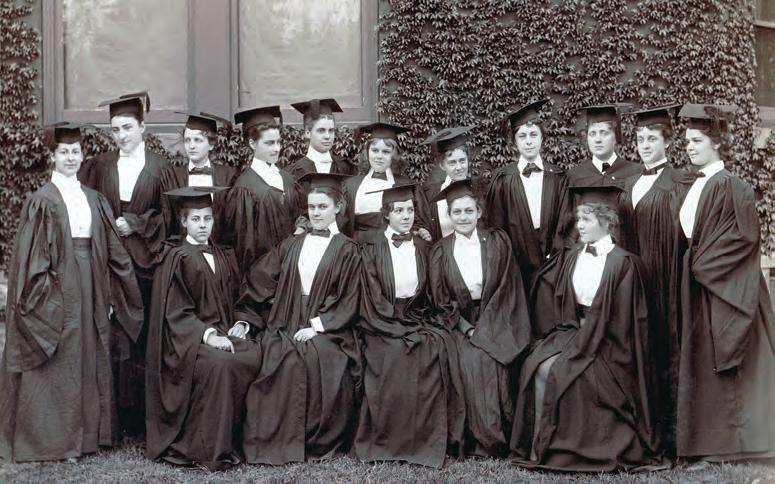
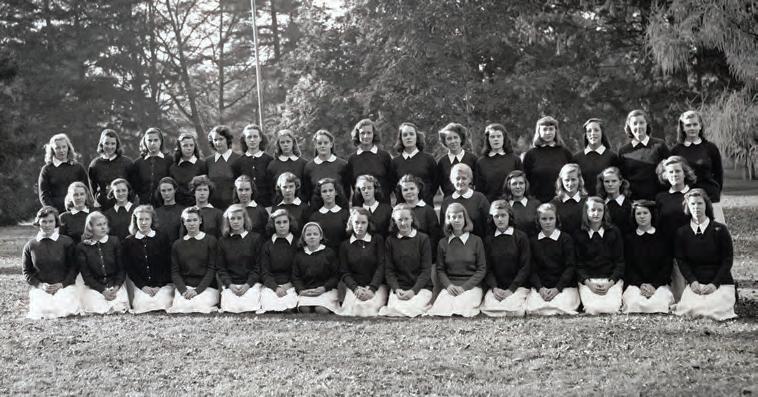
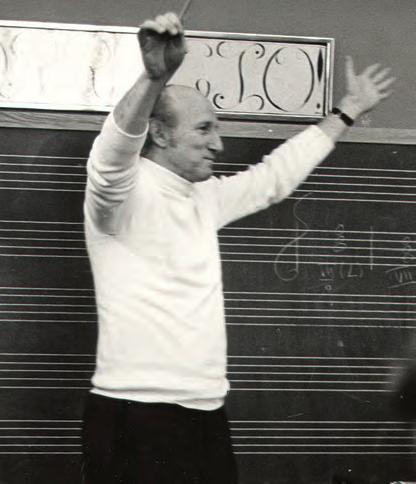

HARMONY THROUGH THE YEARS: Celebrating the legacy of Masters’ Glee
The members of the Glee Clubs of 1963-1981 affectionately called beloved music teacher and conductor John (Jack) Pierpont “Mr. P.” Pierpont began his teaching career in 1963 at Masters and for the next two decades instilled a love of music in his students and encouraged them to strive for excellence in all their pursuits.
Samia Mastandrea-Buthman ’79 fondly remembers Glee Club with Mr. P. “At the end of Glee Club performances, after he had swooped his hands and fingers closed on the final note we’d sung, with just an approving smile and a nod, he’d let us know that the music we’d just made all together had been something especially sublime. It was a feeling of accomplishment and of giving that we took away with us into other areas of our lives, into the rest of our lives.”
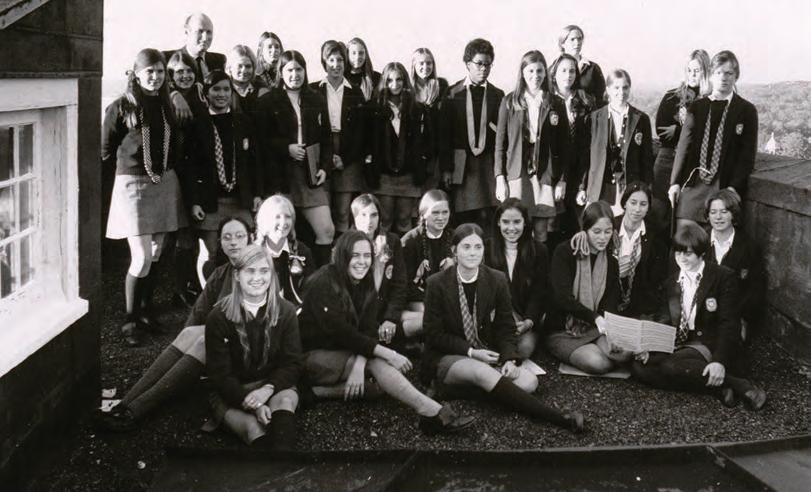

Campus
$68 Million
Building With All Our Might
• Spaces that inspire creativity and ingenuity
• Buildings that optimize deep learning
• Areas designed to encourage natural collaboration
• Focus on sustainability
Community
$24 Million
Supporting Our Students and Faculty
• Shared values and diverse perspectives
• Accessibility for students of all backgrounds
• Expanded worldview for all students
• Culture of inclusivity and respect
Stability
$18.5 Million
Building With All Our Might
• A strong financial foundation to plan for the future
• Freedom to make strategic investments when necessary
• The means to recruit and retain outstanding faculty
• Resources to enrich programs, facilities and technology
Next Projects:
Strayer Hall and the Theater
Goal: To create a new home for the performing arts in which talented performers can excel, in which all students can benefit from exposure to the arts, and in which our community can gather to share and celebrate school performances.
Completed Projects:
• The Innovation and Entrepreneurship Center
• The Library and Digital Resource Center
• Strong, Thompson,Ford and McCormack Dorms
The Masters Fund
Goal: As we look toward a promising future, we must ensure that today’s student experience remains unparalleled. The Masters Fund provides immediate, direct support to our current students and program.
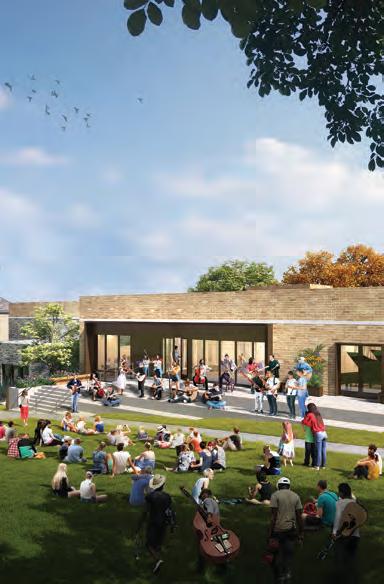
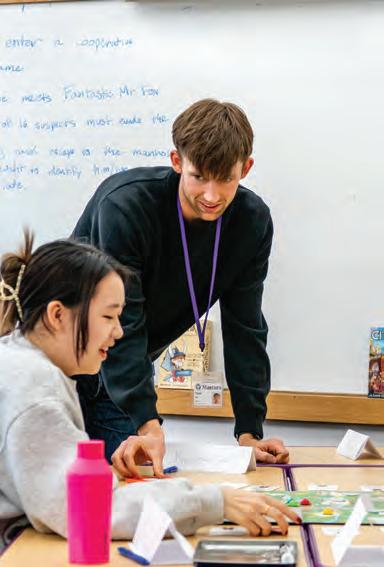
Growing Our Endowment
Goal: By investing in the endowment now, we ensure that in the future we will have the financial security to invest in our students, faculty, programs and educational initiatives, facilities, and technology.
